News from the Group
August 2025
Point-of-care-Ultrasound in Mangochi District, Malawi, to improve rural healthcare diagnostics
In resource-limited environments, ultrasound technology plays a vital role in improving clinical outcomes by offering essential diagnostic capabilities—especially in underserved rural communities facing financial constraints. Point-of-care Ultrasound (POCUS) stands out as an accessible, affordable solution that supports timely clinical decision-making and promotes patient safety. Its adaptability allows healthcare providers to manage a wide spectrum of conditions, from infectious diseases to acute emergencies, helping to close critical gaps in healthcare delivery.
In August and September 2025, the Kamuzu University of Health Sciences (KUHeS) partnered with the Bernhard Nocht Institute for Tropical Medicine (BNITM) conducted two Point-of-Care Ultrasound (POCUS) training courses aimed at strengthening diagnostic capabilities in rural Malawi. The courses were organized and run by Grace Banda-Katha, KUHeS, Dr. Paul Rahden, BNITM, and Dr. Benno Kreuels, BNITM. Charles Hassan, Mangochi District Hospital, supported the organization of the training course in Mangochi and Moustapher Sande and Vhinthenga Namasiku, KUHeS, supported organising the advanced training course in Blantyre.
The first course was a two-day train-the-trainer program involving eight experienced medical professionals from KUHeS who are based in Mangochi, Mangochi District Hospital, from Queen Elisabeth Central Hospital, Nkhoma Mission Hospital and Mama Khadija Health Centre. Participants received advanced POCUS instruction and were equipped to serve as trainers in subsequent sessions. Graduates of this program went on to help facilitate the beginner-level course in Mangochi.
The beginner training welcomed 15 participants from various departments across Mangochi District Hospital. During the five-day course, the attendees were introduced to foundational POCUS techniques and key diagnostic protocols, including FAST, FASH, and CURLS.
Following a comprehensive needs assessment, it became clear that additional ultrasound machines were essential to meet the growing diagnostic demands. In response, new machines were procured and delivered in September. These devices are now actively supporting clinical services at Mangochi District Hospital, marking a significant step forward in improving healthcare access and quality in the region.
These trainings are part of the wider collaborative effort in “Taking Point-Of-Care Ultrasound to the District in Malawi” funded by the Else Kröner-Fresenius-Stiftung (EKFS). More information can be found on the EKFS website: https://ekfs.de/humanitaere-foerderung/aktuelle-foerderungen/taking-point-care-ultrasound-pocus-district
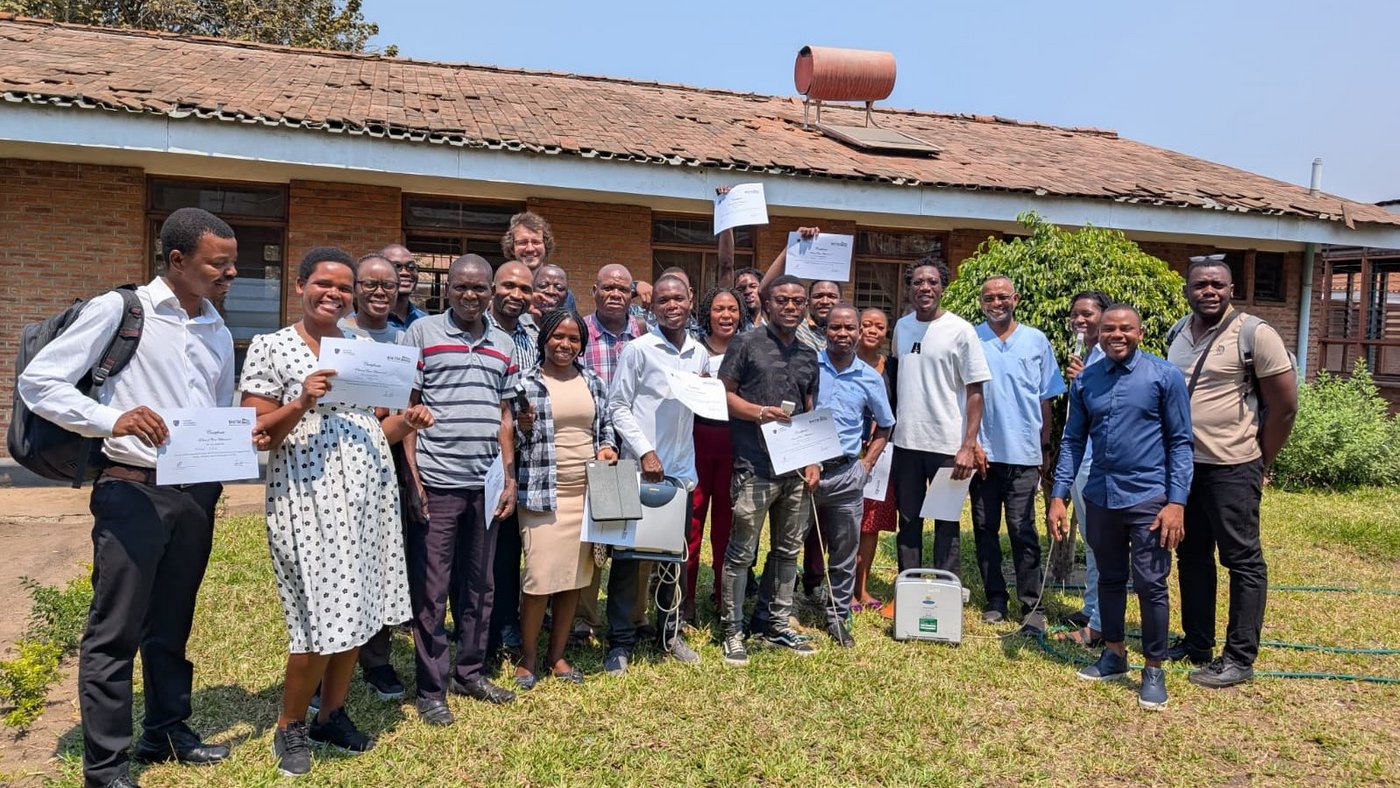

June 2025
Documenting Traditional Snakebite Remedies in Malawi’s Herbal Medicine
Snakebites pose a significant health threat in many rural parts of Malawi, where access to modern healthcare can be limited. As a result, traditional medicine remains a crucial first line of treatment, and one that is deeply rooted in cultural knowledge passed down through generations. However, there is little to no research on the plants used in traditional medicine for snakebite envenoming.
A new project investigates the traditional medical practices used for treating snakebite envenoming. The research project is led by Njova Tembo, a doctoral student based at Kamuzu University of Health Sciences (KUHeS), Blantyre, Malawi. The project is a cooperation between KUHeS and the Research Group Neglected Diseases and Envenoming and the Junior Research Group Ethnopharmacology and Zoopharmacognosy at the Bernhard Nocht Institute for Tropical Medicine (BNITM). The fieldwork for this project was conducted in Malawi’s Southern Region, specifically targeting the districts of Phalombe, Machinga, and Zomba. Within these regions, seven key research sites were identified: one in Phalombe, three in Machinga, and three in Zomba. These locations are well-established gathering points for traditional healers, many of whom are formally registered with the Herbalist Association of Malawi. Their communal nature and structured organisation allowed for deep engagement with individuals who hold specialised knowledge in treating snakebites using locally sourced medicinal plants.
In total, 31 traditional healers were interviewed over the course of this phase of the study. These herbalists shared detailed information on the specific remedies they use, offering insight into the methods of preparation, administration and dosage, and perceived effectiveness of each treatment. Through these interviews, the research team documented an impressive catalogue of 77 different medicinal plants that are used locally in the treatment of snakebite. Beyond verbal interviews, many herbalists also guided the research team to the actual locations where these plants are found. These site visits provided valuable ethnobotanical context and allowed for proper identification and classification of the plants. This part of the work was conducted in collaboration with two key scientific institutions in Malawi: The National Herbarium and Botanical Gardens (NHBG), which supported accurate identification of plant species, and the Forest Research Institute of Malawi (FRIM), which assisted with access to herbalist meeting sites in collaboration with the officers from National forestry, and ecological assessments.
While this initial phase focused on documentation and field engagement, the project is now moving into a crucial next stage: the collection of samples and laboratory analysis of the medicinal plants. This work will seek to understand the pharmacological properties of the documented species and determine their potential for integration into formal snakebite treatment protocols. By bridging indigenous knowledge with scientific research, this study not only aims to validate and preserve traditional healing practices but also to contribute to more accessible and effective snakebite treatment options across Malawi and beyond.
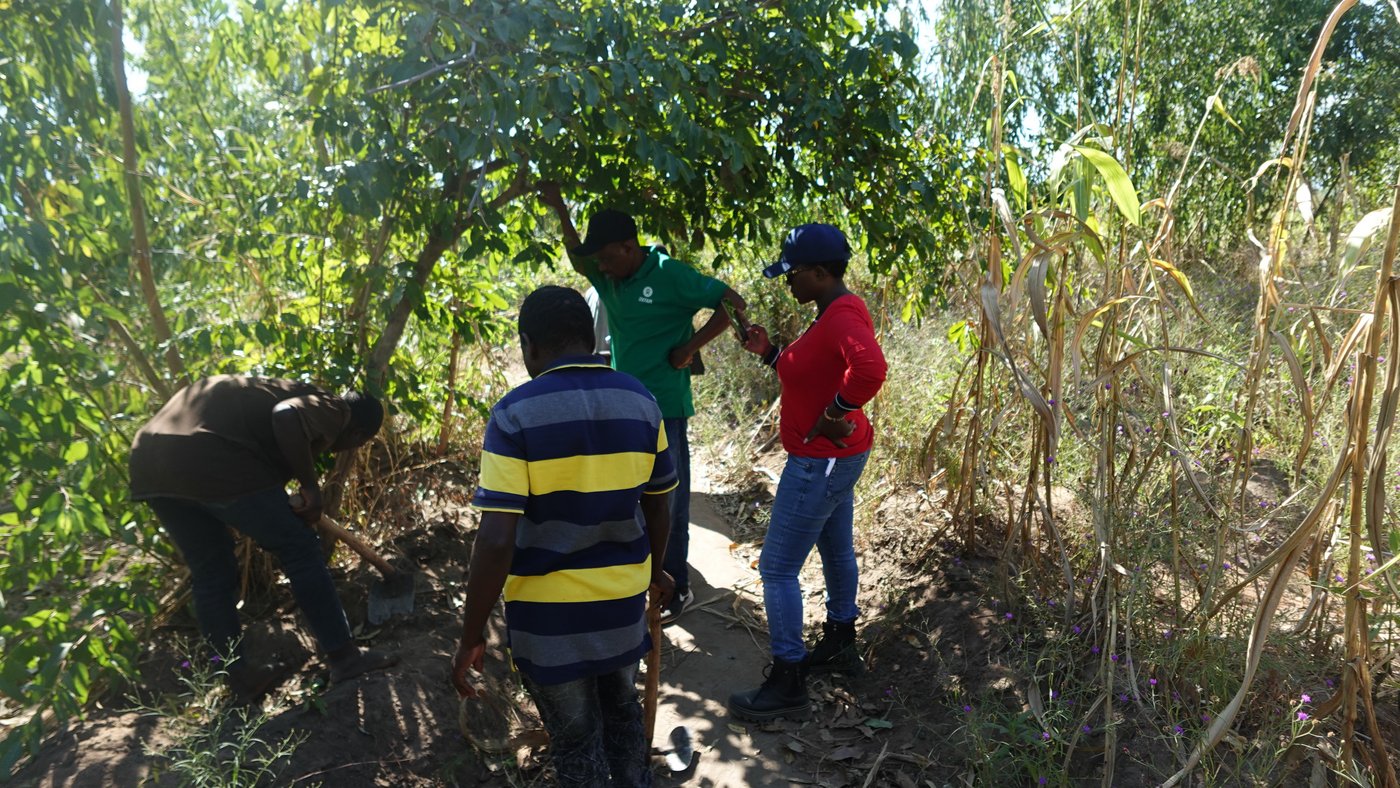
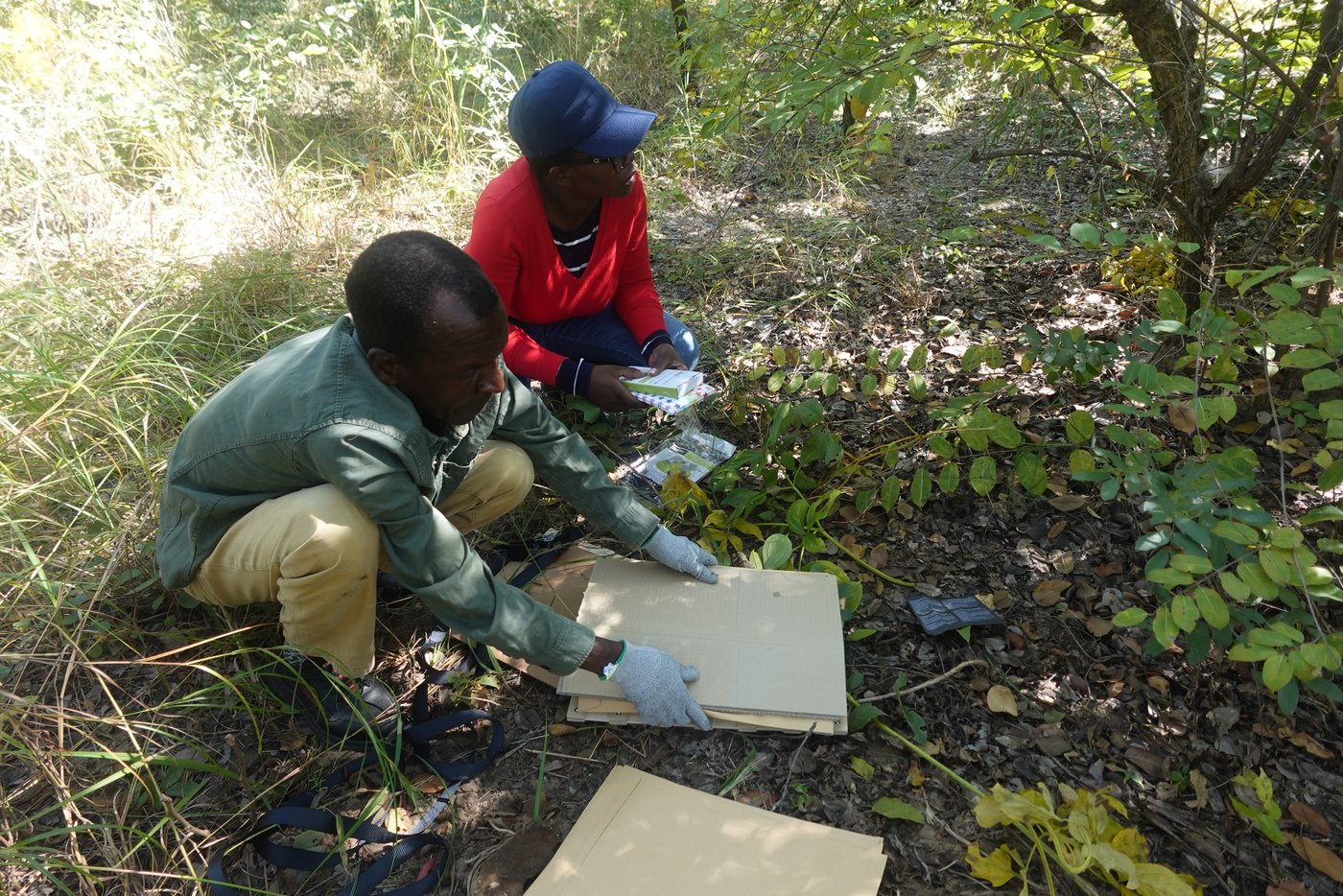
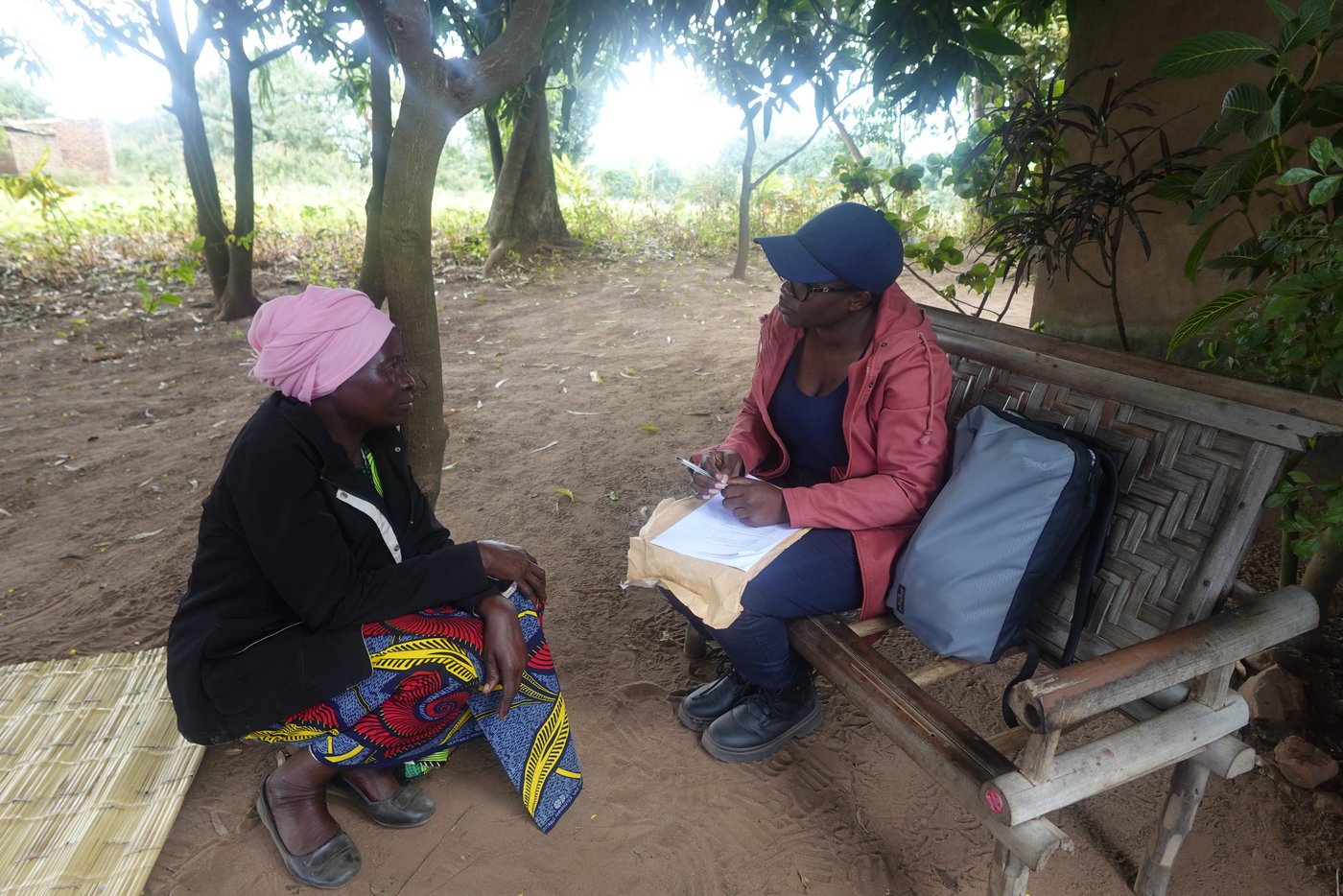
April 2025
First POCUS training of hospital partnership in Zimbabwe
South-South-North partnerships can enable sustainable knowledge exchange and resource-sharing between regions. They help integrate innovations like point-of-care ultrasound into healthcare systems, improving capacity-building and patient outcomes while fostering sustainable development.
Leveraging the experience in conducting Point-of-Care Ultrasound (POCUS) training in Malawi, the Bernhard Nocht Institute for Tropical Medicine (BNITM) in collaboration with the University of Zimbabwe conducted a first POCUS training course in early April 2025 with support from the Kamuzu University of Health Sciences (KUHeS) as part of the hospital partnership* in Harare, Zimbabwe. The course was led by Dr. Leolin Kadzira from the University of Zimbabwe, Dr. Portia Ndhlumbi, from the University of Zimbabwe, and Dr. Paul Rahden from BNITM, with additional support provided by Dr. Moustapher Sande, Dr. Martin Kamponda and Dr. Vhinthenga Namasiku from KUHeS.
This first training was well attended, with 20 participants representing the departments of internal medicine of Parirenyatwa and Harare Central Hospital introducing POCUS protocols for common indications in Harare. It demonstrated the strength of the collaboration, as Malawian colleagues who had previously been trained as point-of-care ultrasound trainers acted as trainers for their Zimbabwean colleagues. Their expertise and practical guidance provided the participants with important skills to improve patient care. Beyond technical learning, the exchange fostered professional connections and a shared commitment to improving healthcare across borders.
* The Hospital Partnership is a funded project of the Hospital Partnerships funding programme of the Deutsche Gesellschaft für Internationale Zusammenarbeit (GIZ) GmbH. The programme is commissioned and funded by the German Federal Ministry for Economic Cooperation and Development (BMZ). The Else Kröner-Fresenius-Stiftung (EKFS) co-finances the funding programme on a part-financed basis. Homepage: https://hospitalpartnerships.org/
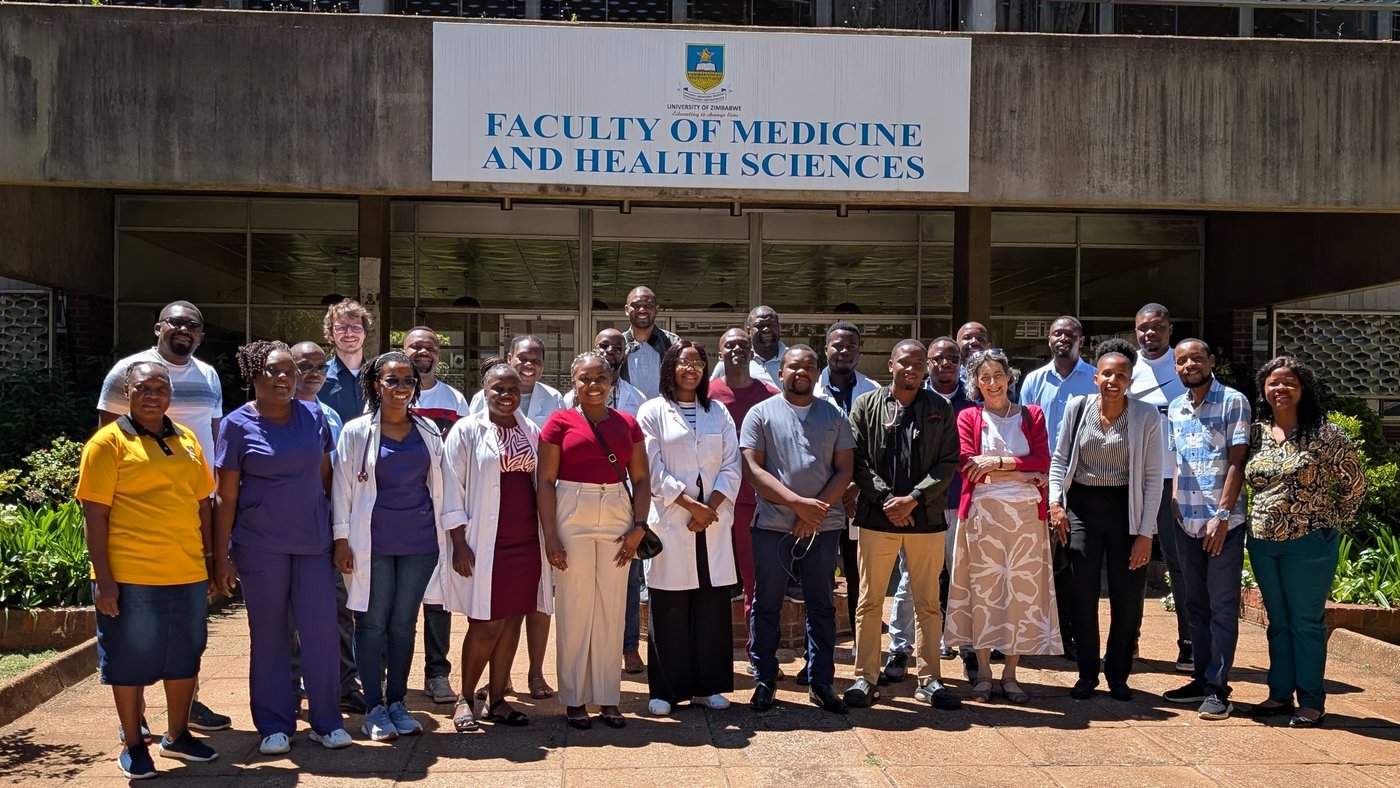
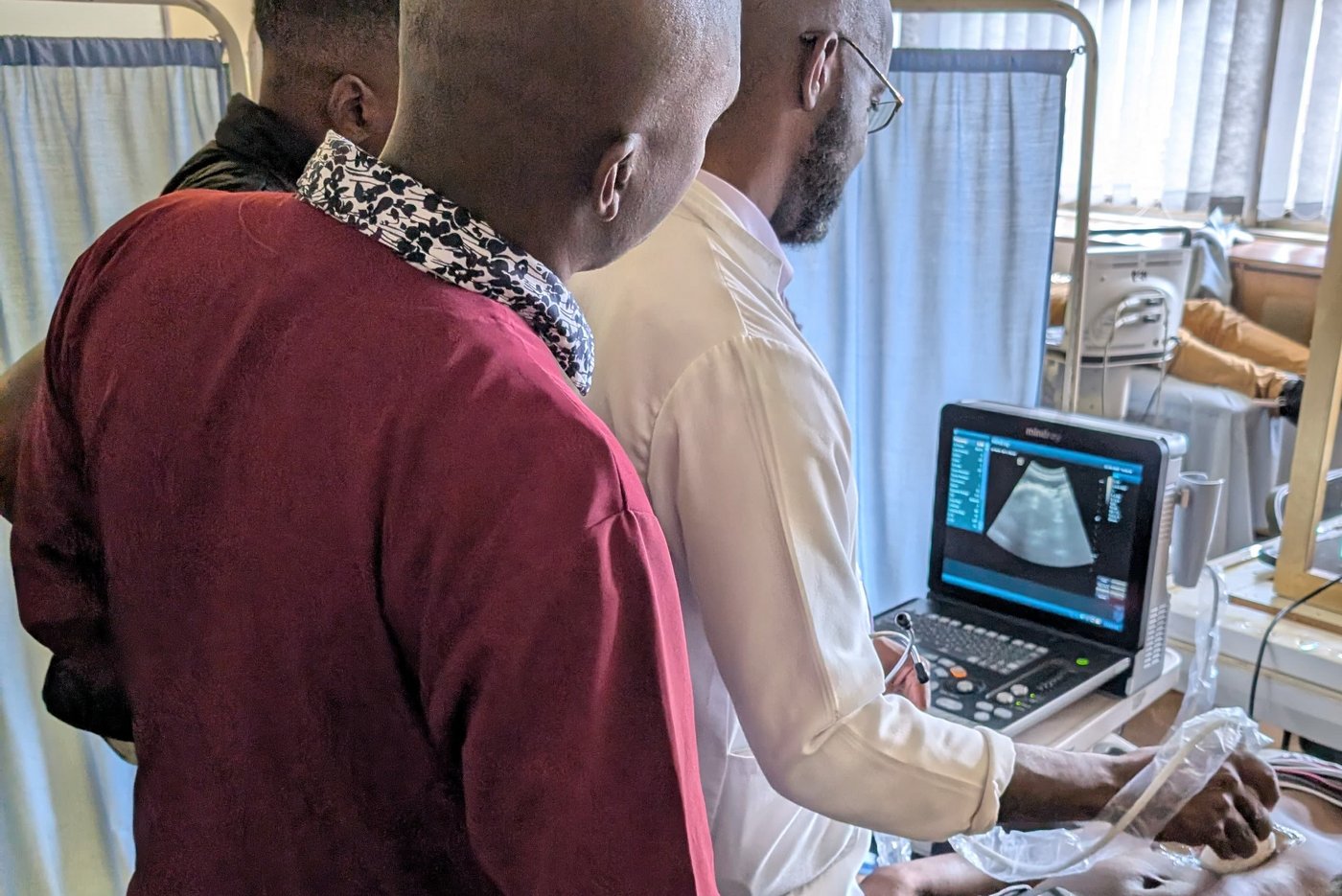
March 2025
Strengthening Snakebite Response Through Community and Clinical Training in Neno
Snakebite envenoming remains a neglected condition, particularly in rural areas where access to timely and effective treatment is limited. In Malawi, many communities face challenges including lack of awareness, delayed healthcare access, and limited availability of effective treatment and trained personnel.
End of March 2025, the Neno District Hospital and the Bernhard Nocht Institute for Tropical Medicine (BNITM) with support from Partners in Health (APZU) and the African Snakebite Institute (ASI) carried out community engagement activities in seven primary and secondary schools and held the second training on snakebite envenoming in Neno, Malawi.
Over two days, our team including our PhD student Moses Banda Aron, and snakebite enthusiasts and experts Tim Brammer (ASI) and Joseph Tepani, reached more than 1,600 participants with their initiative and talked about common snakes and behaviour towards snakes to avoid snakebites. Every school was provided with a Chichewa edition of their newly released field guide on the snakes of Malawi, along with informational flyers highlighting the most common snake species found in the region.
In addition, a comprehensive snakebite management training was conducted across the same period. Building on our training efforts from the previous year, we held a second beginner-level course on snakebite envenoming for healthcare professionals from 15 medical facilities, with over 82 healthcare workers taking part. On the second day, 15 participants from three different facilities attended an advanced session, where they explored case studies, shared experiences from the past year, and discussed common challenges in snakebite treatment.
* The Hospital Partnership is a funded project of the Hospital Partnerships funding programme of the Deutsche Gesellschaft für Internationale Zusammenarbeit (GIZ) GmbH. The programme is commissioned and funded by the German Federal Ministry for Economic Cooperation and Development (BMZ). The Else Kröner-Fresenius-Stiftung (EKFS) co-finances the funding programme on a part-financed basis. Homepage: https://hospitalpartnerships.org/
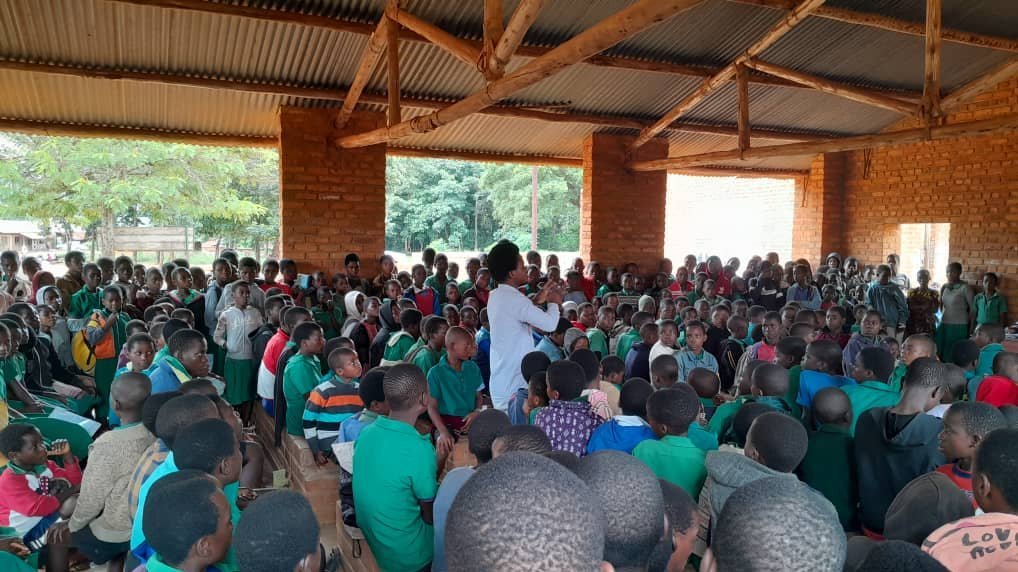
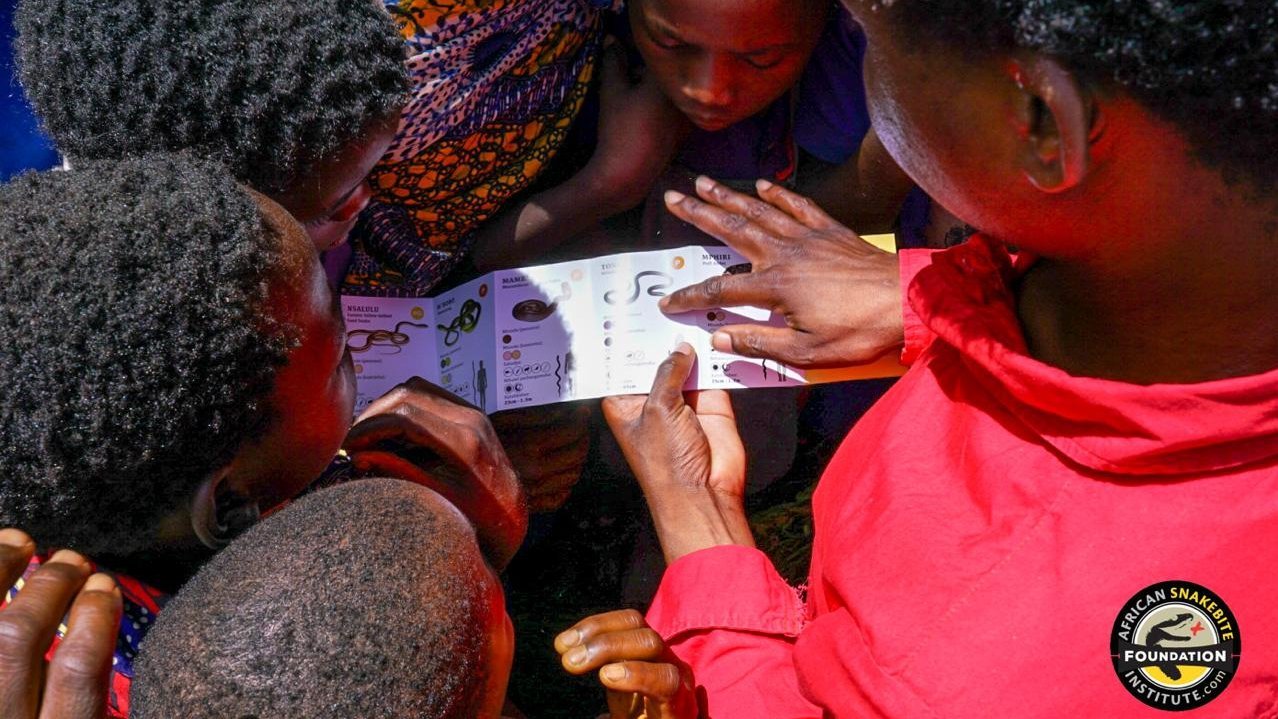
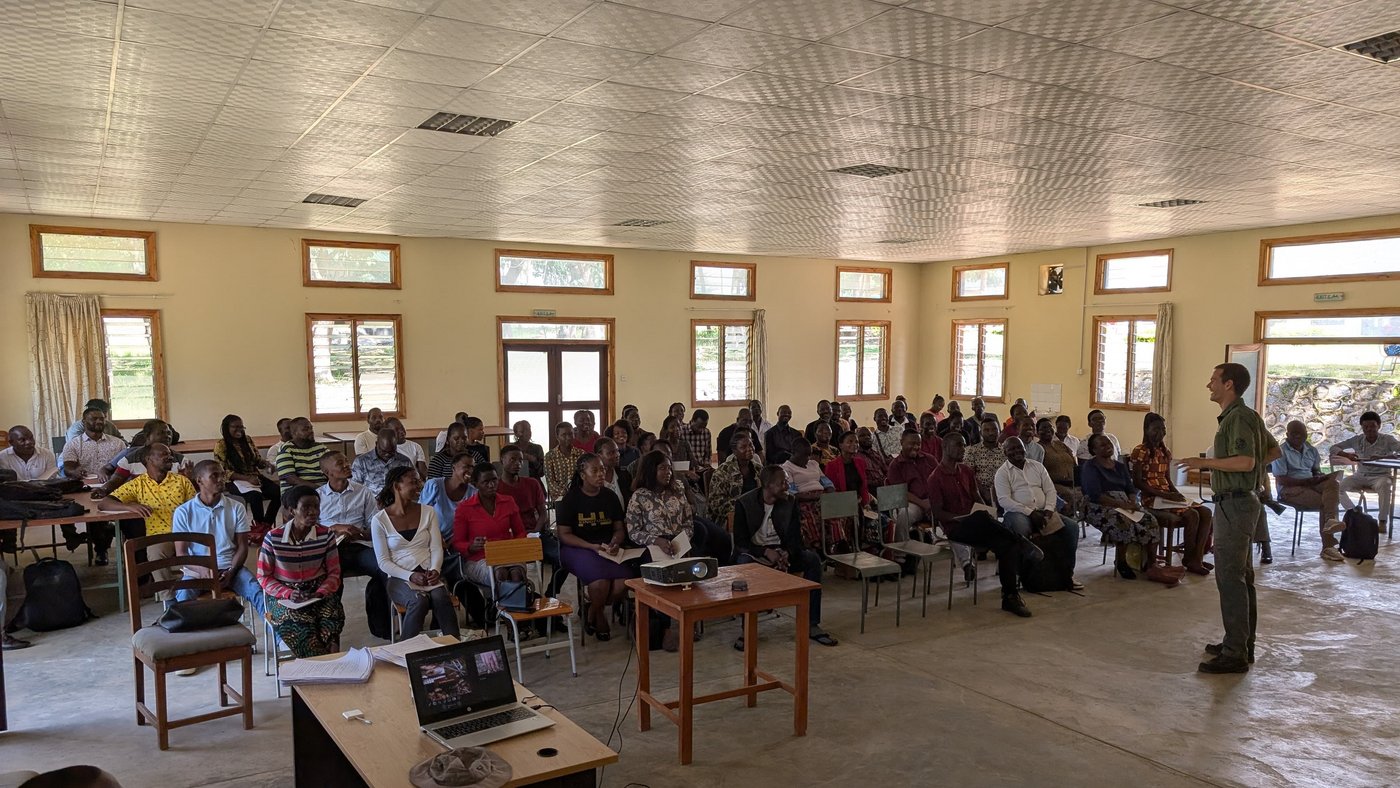
March 2025
Implementation of Point-of-care-Ultrasound in Mangochi District, Malawi, to improve rural healthcare diagnostics
In low-resource settings, ultrasound technology can improve clinical care by providing crucial diagnostics, particularly in financially constrained rural areas. Point-of-care Ultrasound (POCUS) is a simple tool that can guide clinical decision-making and enhance patient safety. POCUS can be used for a range of conditions, from infectious diseases to emergencies, bridging significant gaps in healthcare provision.
As part of the project “Taking Point-Of-Care Ultrasound to the District in Malawi”, funded by the Else Kröner-Fresenius Stiftung (EKFS), the Kamuzu University of Health Sciences (KUHeS) and the Bernhard Nocht Institute for Tropical Medicine (BNITM) jointly held the second POCUS training course in Mangochi District Hospital in Malawi. The course was organized and conducted by Dr. Tamara Phiri, KUHeS, Dr. Grace Banda-Katha, KUHeS, Dr. Paul Rahden, BNITM, Dr. Benno Kreuels, BNITM and supported by Dr. Charles Hassan, Mangochi District Hospital.
During the 4-days course in March 2025, 13 participants from various departments acquired basic POCUS skills. Comprehensive POCUS protocols for common diagnoses in district facilities were introduced to facilitate clinical decision-making.
More information can be found on the EKFS website: https://ekfs.de/humanitaere-foerderung/aktuelle-foerderungen/taking-point-care-ultrasound-pocus-district
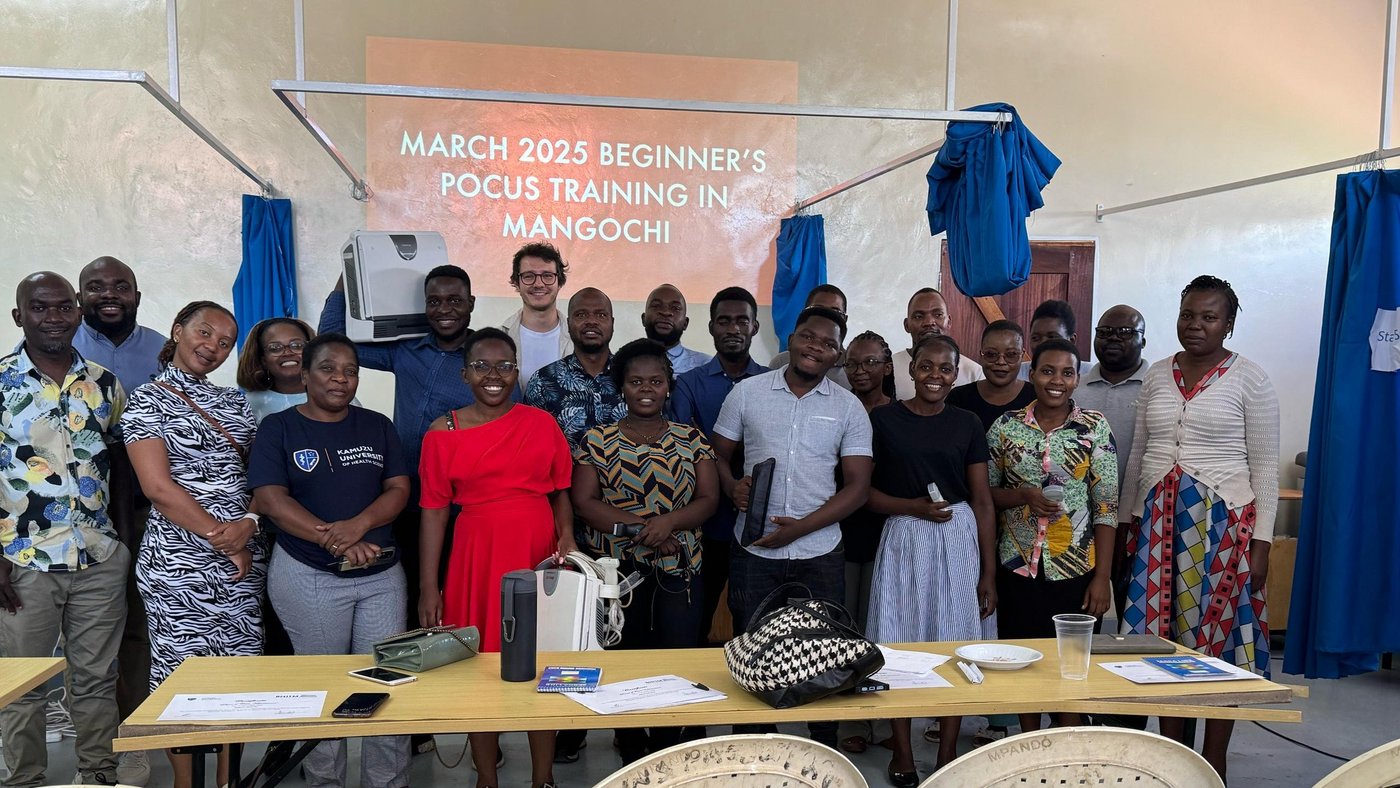
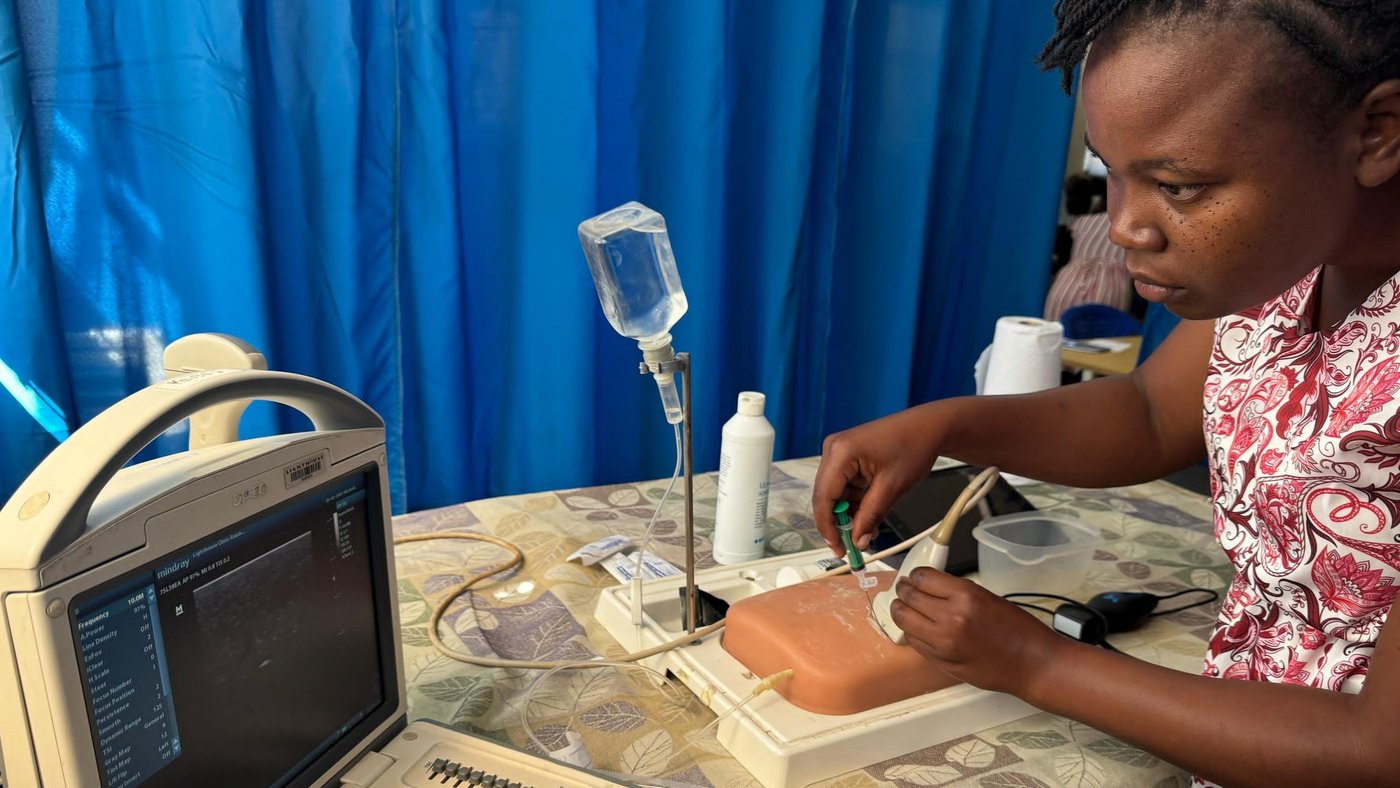
February 2025
Kick-off of VIPER-App project in Hue, Vietnam
Mobile apps and other digital tools can significantly improve the public's and healthcare professionals' access to trustworthy health information. However, their impact is largely determined by their relevance, accessibility, reliability, and ease of use. By incorporating feedback from target users during the development phase, one can create tools that genuinely address their needs and make a meaningful difference.
On 19-20th of February 2025, the Research Group Neglected Diseases and Envenoming was in Hue, Vietnam, for the kick-off of the VIPER-App* project together with the University of Bamberg. Hosted by the Faculty of Public Health at the Hue University of Medicine and Pharmacy (Hue UMP), the meeting on the 19th of February also featured representatives from three provinces where surveys will be held: Cho Ray Hospital, Ho Chi Minh City (South Vietnam), Quang Ngai Provincial Department of Health, Quang Ngai province (Central Vietnam), and Vinh Phuc General Hospital, Vinh Phuc province (North Vietnam).
During the official kick-off meeting, an overview of the study was presented along with the data collection plan for provincial representatives. This was followed by discussions on the survey implementation, during which representatives provided suggestions and comments. Additionally, a PhD candidate presented her proposal that is linked to the VIPER App project. Internal discussions continued the following day and in the subsequent days.
*This project is supported by the German Federal Ministry of Education and Research (BMBF) as part of the German Alliance for Global Health Research (GLOHRA).
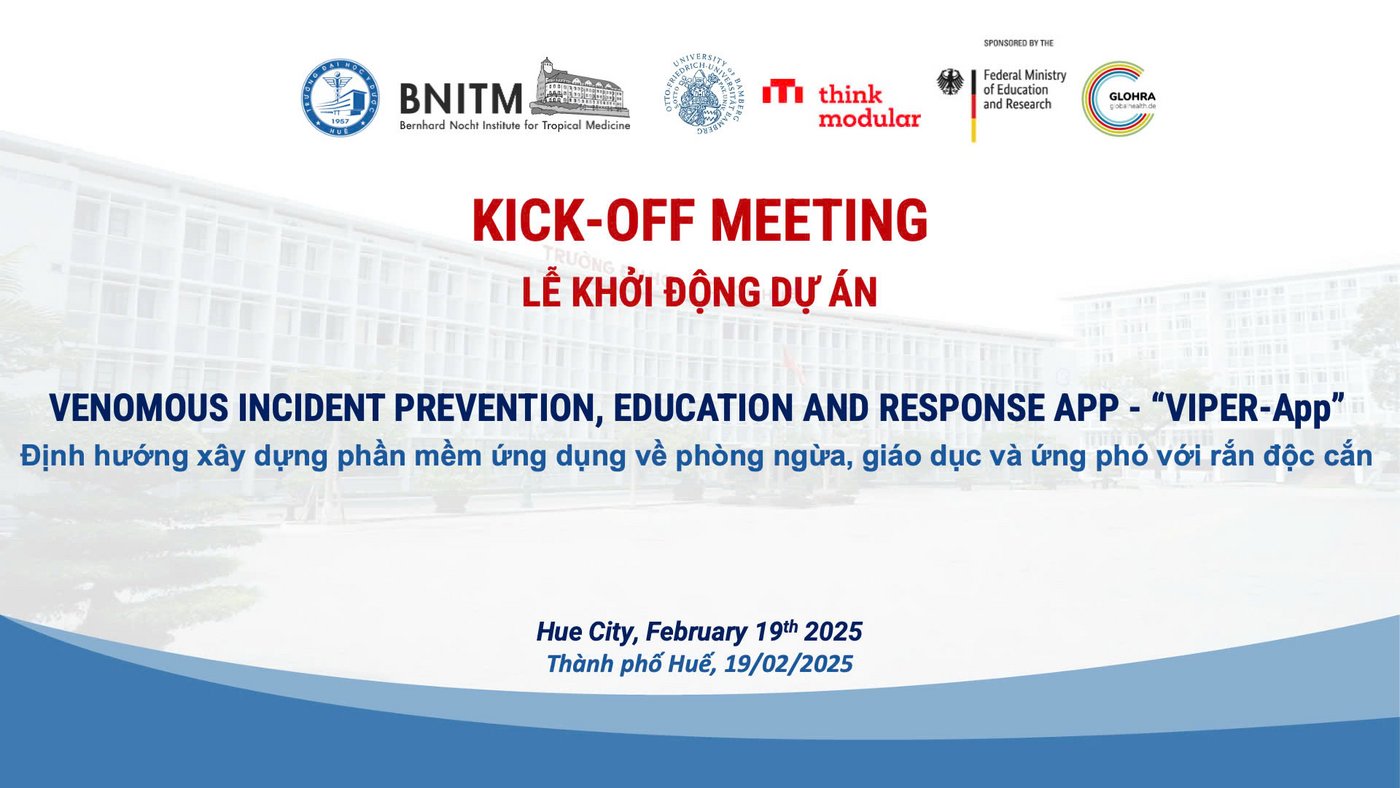


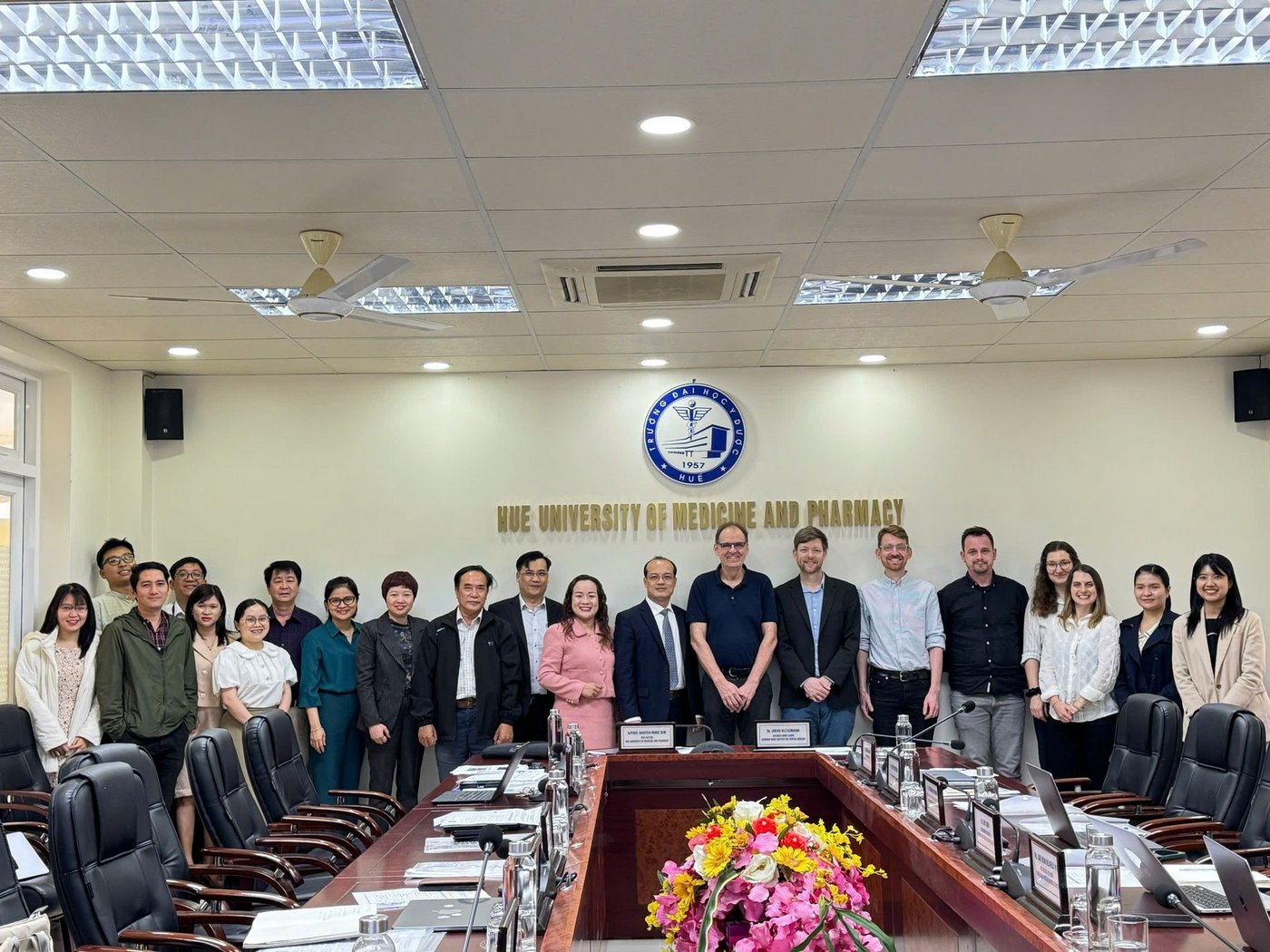
November 2024
Second training on clinical management of snakebite envenoming in Wa, Ghana
Snakebites pose a significant global health threat that requires thorough understanding and timely intervention. By equipping medical personnel with essential knowledge and skills, the aim is to improve clinical treatment, mitigate the long-term health consequences and ultimately protect the lives of communities affected by snakebites.
Following the success of the initial training in 2023, on the 27th and 28th of November, the Neglected Diseases and Envenoming group conducted a second round of snakebite training in Ghana together with the Global Health and Infectious Diseases Research Group at the Kumasi Center for Collaborative Research. This year, two distinct courses were offered: a beginner course for new participants and a follow-up session for those who attended last year and individuals with more experience in the management of snakebites. Participants heard from local experts Dr Steve Blankson and Dr Nabil Dekpeh, as well as internal experts Dr Melvin Agbogbatey, Dr Jörg Blessmann and Dr Benno Kreuels. The training is part of the Hospital Partnership* between the Upper West Regional Hospital and BNITM.
The beginner course focused on essential knowledge and skills for managing snakebite cases, including identification of venomous snakes, first aid techniques, and antivenom need indications. Participants learned through a combination of lectures, hands-on practice, and interactive discussions, ensuring they left with a solid foundation in snakebite management.
The advanced session delved deeper into complex cases and treatment protocols also based on the snakebite cases of the introduced clinical database. Attendees had the opportunity to share their experiences, discuss challenges, and refine their skills with expert guidance. Both trainings were well-received with over 100 participants in total.
* The Hospital Partnership is a funded project of the Hospital Partnerships funding programme of the Deutsche Gesellschaft für Internationale Zusammenarbeit (GIZ) GmbH. The programme is commissioned and funded by the German Federal Ministry for Economic Cooperation and Development (BMZ). The Else Kröner-Fresenius-Stiftung (EKFS) co-finances the funding programme on a part-financed basis. Homepage: https://hospitalpartnerships.org/
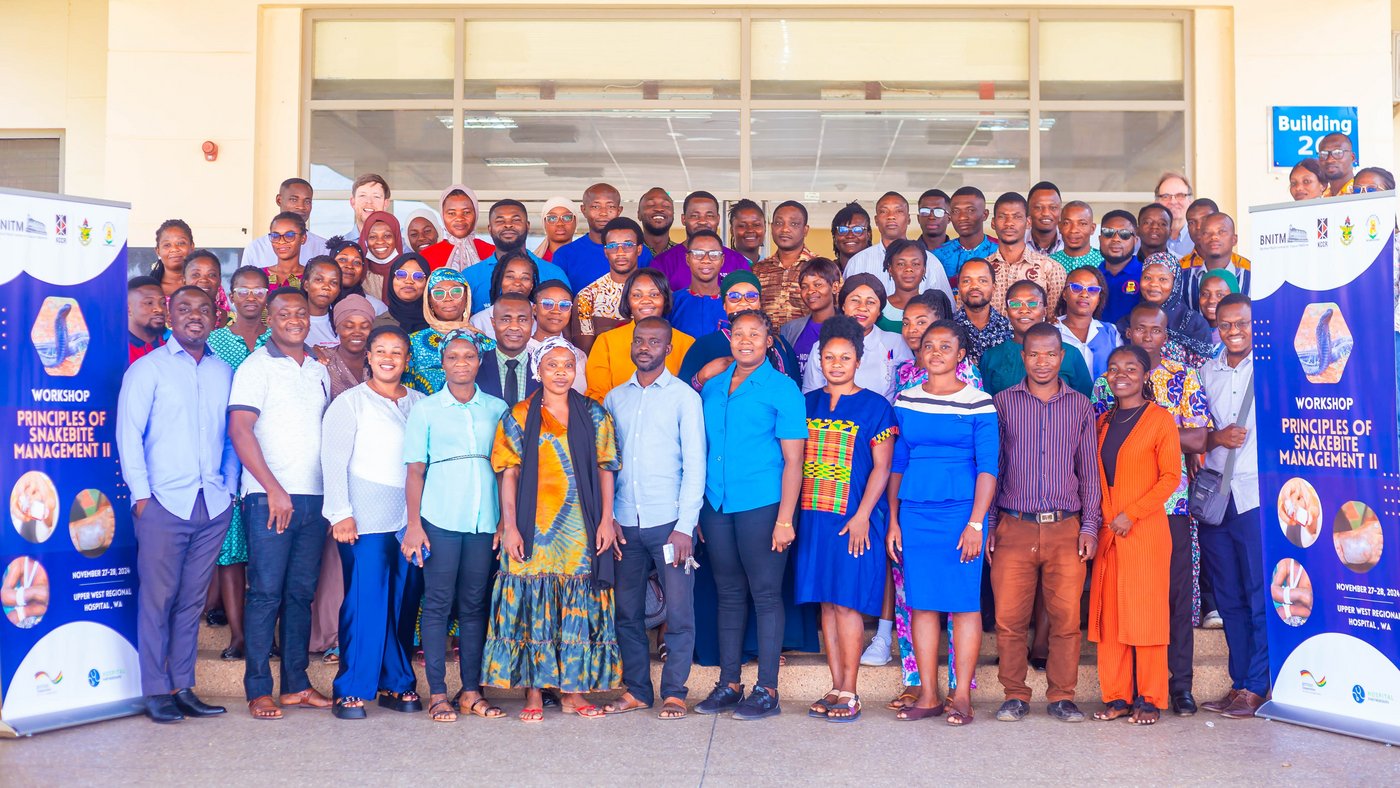
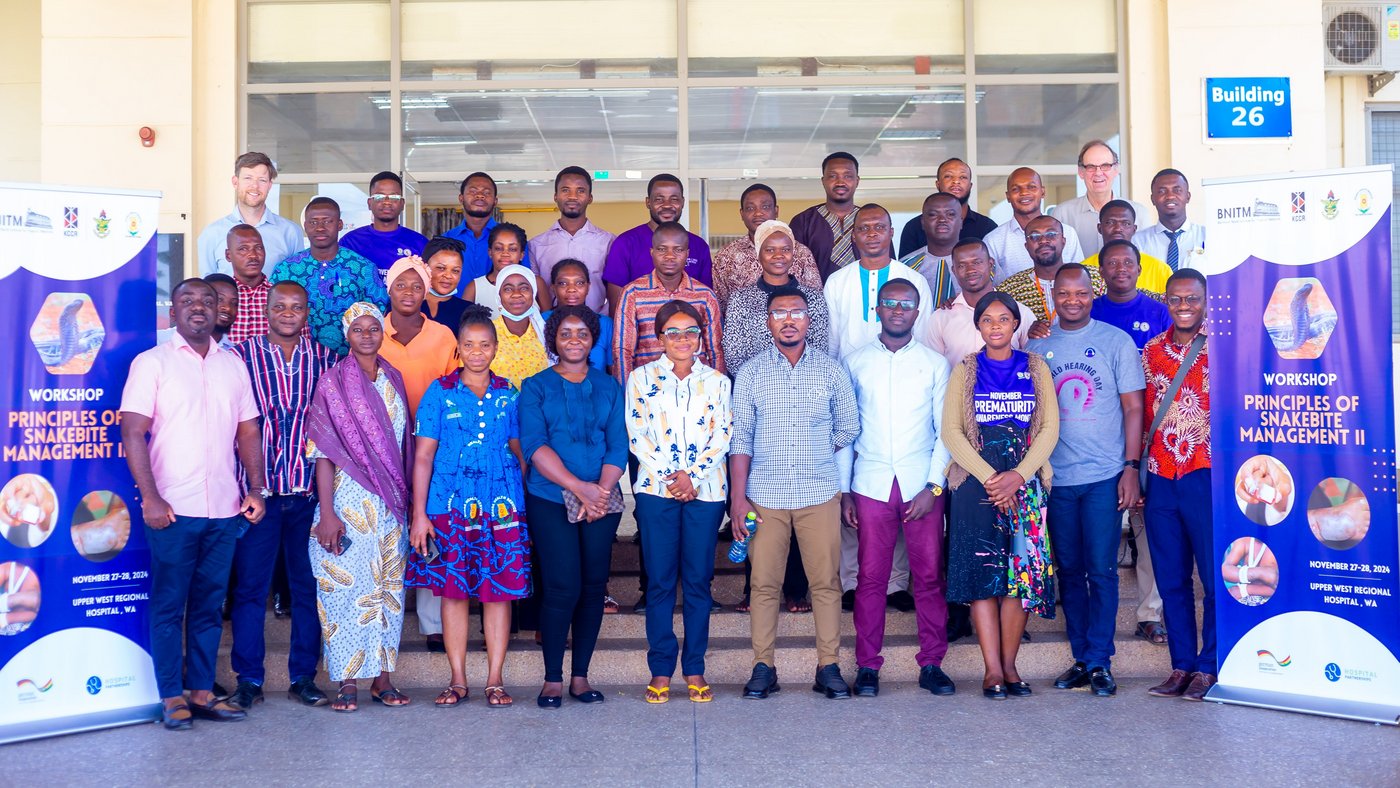
October 2024
No hocus pocus: POCUS trainings in Blantyre and Mangochi
In low-resource settings, ultrasound technology can significantly enhance clinical care by providing crucial diagnostics particularly in financially constrained rural areas. Point-of-care Ultrasound (POCUS) is a simple, cost-effective tool with the potential guide clinical decision making and enhance patient’s safety. This versatile tool addresses a range of conditions, from infectious diseases to emergencies, bridging significant gaps in healthcare provision.
In October 2024, the Kamuzu University of Health Sciences (KUHeS) and the Bernhard Nocht Institute for Tropical Medicine (BNITM) jointly organised three point-of-care ultrasound (POCUS) training courses. The courses were organized and run by Dr. Tamara Phiri, KUHeS, Grace Banda-Katha, KUHeS, Dr. Paul Rahden, BNITM, and Dr. Benno Kreuels, BNITM. Charles Hassan, Mangochi District Hospital, supported the organization of the training course in Mangochi and Moustapher Sande, KUHeS, supported organizing the training course in Blantyre.
The first course included 14 selected, excellent medical staff from different departments of Queen Elizabeth Central Hospital (QECH), Mangochi District Hospital, Zomba Central Hospital, and Lighthouse Trust, who use POCUS regularly in their daily practice and focused on building local faculty for future courses. All successful graduates of this course then acted as trainers in one of the beginner courses in Blantyre or Mangochi.
In the beginner course in Blantyre 15 participants from different departments at Queen Elizabeth Central Hospital, Neno District Hospital, as well as from the University of Zimbabwe, learned basic POCUS skills including relevant protocols such as FAST, FASH and CURLS. The two participants from Zimbabwe, Portia Vambe and Tavengwa Manenji, are partners in the hospital partnership* project “POCUZ – Point-of-Care Ultrasound for Zimbabwe”. Both will support to set up POCUS trainings in Harare.
The POCUS beginners' course in Mangochi was held for the first time. 14 participants from various departments attended the course where they, similar to the Blantyre course, learned basic POCUS skills. A needs assessment together with first training experiences in the districts will guide tailoring future courses to the local requirements of the district setting.
These trainings are part of the project “Taking Point-Of-Care Ultrasound to the District in Malawi” which is funded by the Else Kröner-Fresenius Stiftung (EKFS). More information can be found on the EKFS website: https://ekfs.de/humanitaere-foerderung/aktuelle-foerderungen/taking-point-care-ultrasound-pocus-district
* The Hospital Partnership is a funded project of the Hospital Partnerships funding programme of the Deutsche Gesellschaft für Internationale Zusammenarbeit (GIZ) GmbH. The programme is commissioned and funded by the German Federal Ministry for Economic Cooperation and Development (BMZ). The Else Kröner-Fresenius-Stiftung (EKFS) co-finances the funding programme on a part-financed basis. Homepage: https://hospitalpartnerships.org/
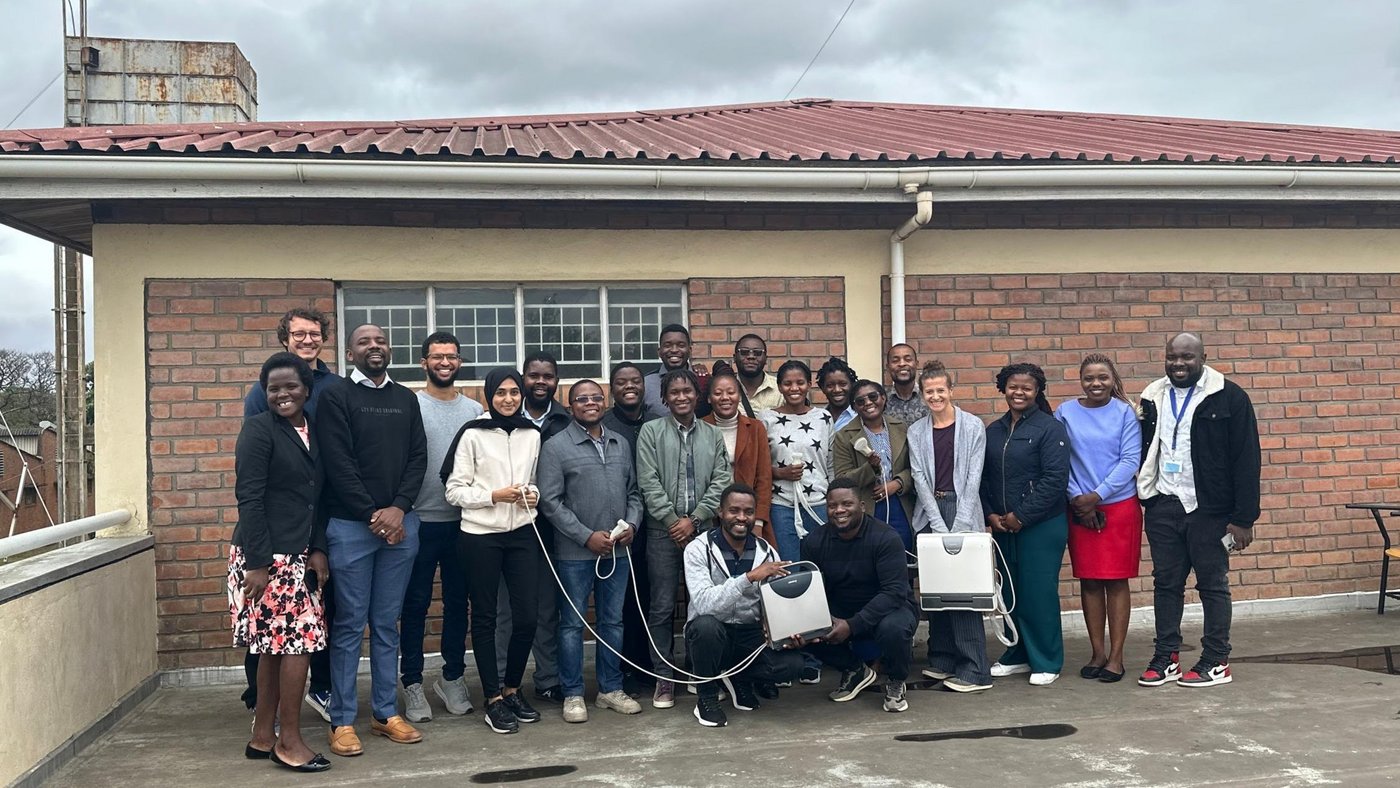
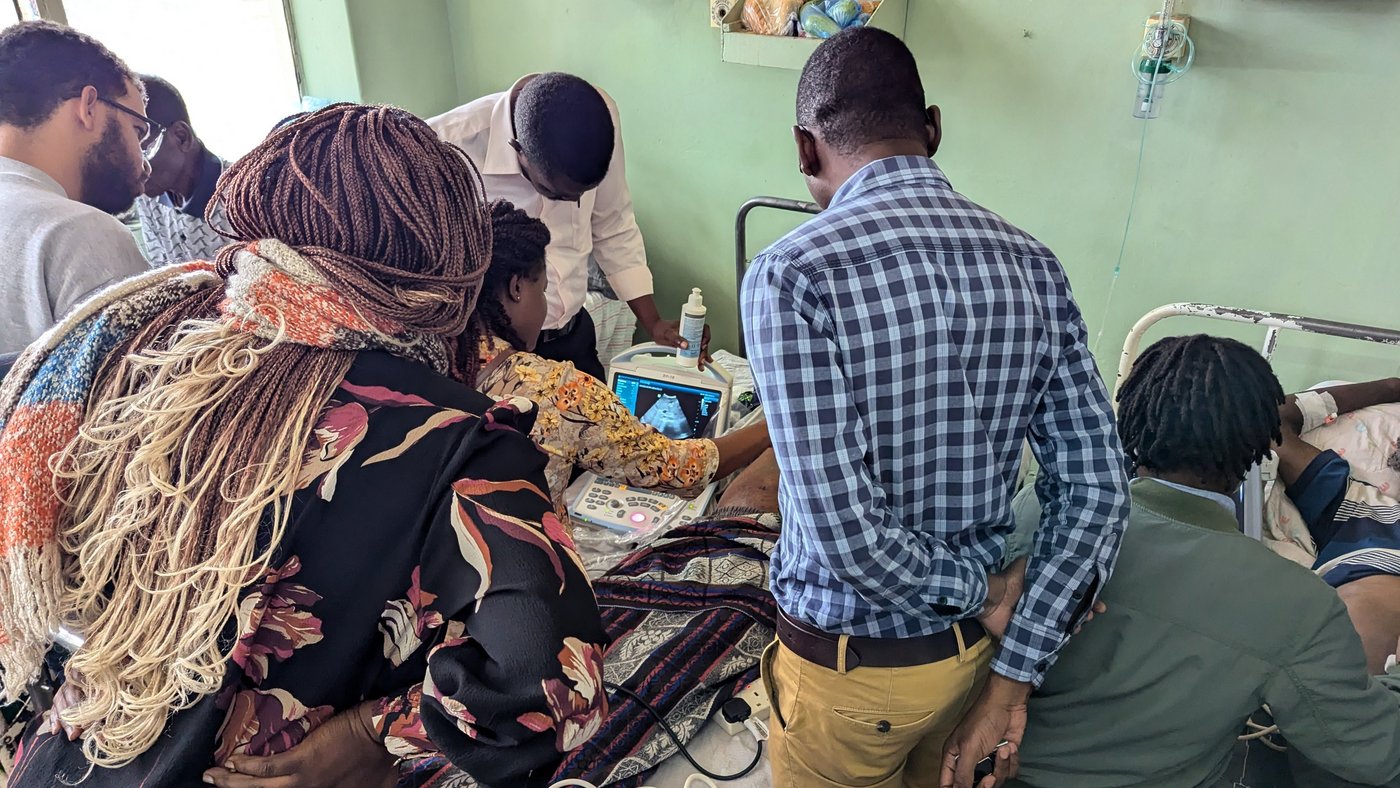
October 2024
New Digital Health Innovation Project: The VIPER-App
Digital tools, such as mobile applications, can improve access to reliable healthcare advice for the public and healthcare professionals. However, the utility of these tools depends on their relevance, accessibility, reliability, and usability. Involving the intended users of these tools in the development process can, therefore, lead to tools designed to have an impact.
We are very pleased to announce that our new project, 'VIPER-App’, was officially launched on the 1st of October 2024. This project will be conducted in cooperation with the University of Bamberg, and together with partners at the Institute for Community Health Research (ICHR) and Think Modular. The project was officially launched with an online kick-off meeting on the 29th of October 2024 and in-person kick-off meeting is scheduled for early 2025 at ICHR in Vietnam.
This project aims to develop a conceptual prototype of a mobile app for snakebite envenoming based on stakeholder needs, feedback from potential users, and feasibility assessments. This project is being conducted in Vietnam over the next two years and is intended to support the WHO’s goal of halving the number of deaths and disabilities resulting from snakebite envenoming by 2030.
The outputs from this project will be 1) a conceptual prototype for snakebite envenoming in Vietnam, 2) assessments of the prototype by stakeholders, and 3) recommendations for the development of digital tools for neglected tropical diseases (NTDs) more broadly.
By integrating the insights and experiences of affected communities, the VIPER-App project aims to make a substantial impact on improving health outcomes. This project addresses immediate health concerns related to snakebites and sets a precedent for developing innovative digital solutions for other NTDs.
We’re looking forward to working together with all our partners in the next two years!
The project is funded by the Federal Ministry of Education and Research (BMBF) as part of the German Alliance for Global Health Research (GLOHRA).
September 2024
Welcome to the team, Bao!
We are thrilled to introduce our latest addition to the team, Bao Truong. Bao is currently pursuing his PhD at UKE/Universität Hamburg in Hamburg, Germany, where he will focus on studying snake distribution and snakebite envenoming in Vietnam.
Bao has been working as a researcher at the Institute for Community Health Research, Hue University in Hue, Vietnam. He is dedicated to promoting awareness of snakes and snakebites, which is important for improving the knowledge of snakebite burden in Vietnam.
His PhD objective is to analyse the distribution of venomous snakes, the risk of snakebite envenoming, and public attitudes towards snakes in Vietnam to improve the prevention and management of snakebite envenoming in Vietnam.
We’re excited to have Bao join our team! His expertise and motivation are a valuable asset, and we look forward to the positive contributions he will make to our work.
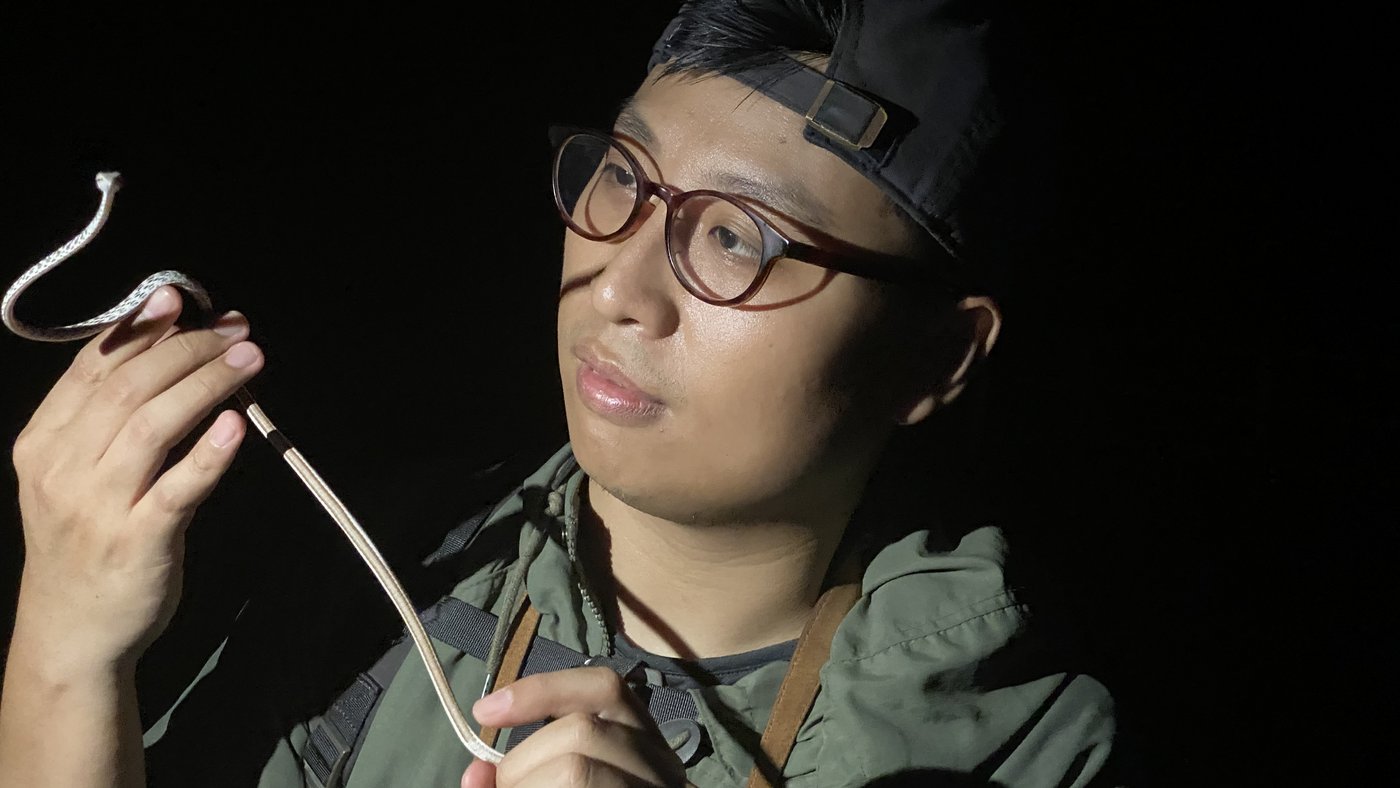
August 2024
From Kuching to Oxford: Presentations on snakebite envenoming at international conferences
Scientific conferences are crucial for the global exchange of knowledge and promote the collaboration needed to make progress in the treatment of snakebite envenoming. This networking contributes directly to the rapid dissemination of innovative approaches and their adaptation to local needs. The exchange at such events is an essential contribution to achieving the WHO goal of halving deaths from snakebites by 2030.
In August, our working group presented the results of its research on snakebite envenoming at two conferences. From 5th to 9th of August, Dr Jörg Blessmann and Bao Truong attended the 10th World Congress of Herpetology in Kuching, Borneo Island, Malaysia. Dr. Blessmann chaired two sessions and additionally presented on ‘Infection after snakebite envenoming – experience in Laos and a review of the literature’ and on ‘Treatment of snakebite envenoming with small molecule therapeutics – what is in the pipeline’. Bao Truong presented the results of his research with Dr Blessmann in Vietnam with the title ‘Distribution of the Medically Important Snakes and the Availability of Antivenom in Vietnam: A Hospital-based Study’. During their visit, they also explored the rich herpetofauna of Borneo on a herping tour, observing snakes and other reptiles and amphibians in their natural habitats.
Later in August, from the 20th to the 22nd, our post-docs, Dr Jade Rae and Dr Paul Rahden, attended the Oxford Venom and Toxins Conference 2024. Jade gave a presentation on European viper bites in Germany, describing the yet-to-be-published epidemiological analysis of data collected from poison centres across Germany. Our team also enjoyed the insights in the development of new therapeutic approaches and clinical experiences from South America, Asia and Africa. Results of a scoping review with contributions of Dr Benno Kreuels were presented highlighting challenges of point of care coagulation testing in snakebite envenoming.
Further presentations of recent results from our research group will be presented at the annual meeting of the DGHT in Bonn and at the conference of Tropical Medicine and Global Health in Düsseldorf. Watch out for more!

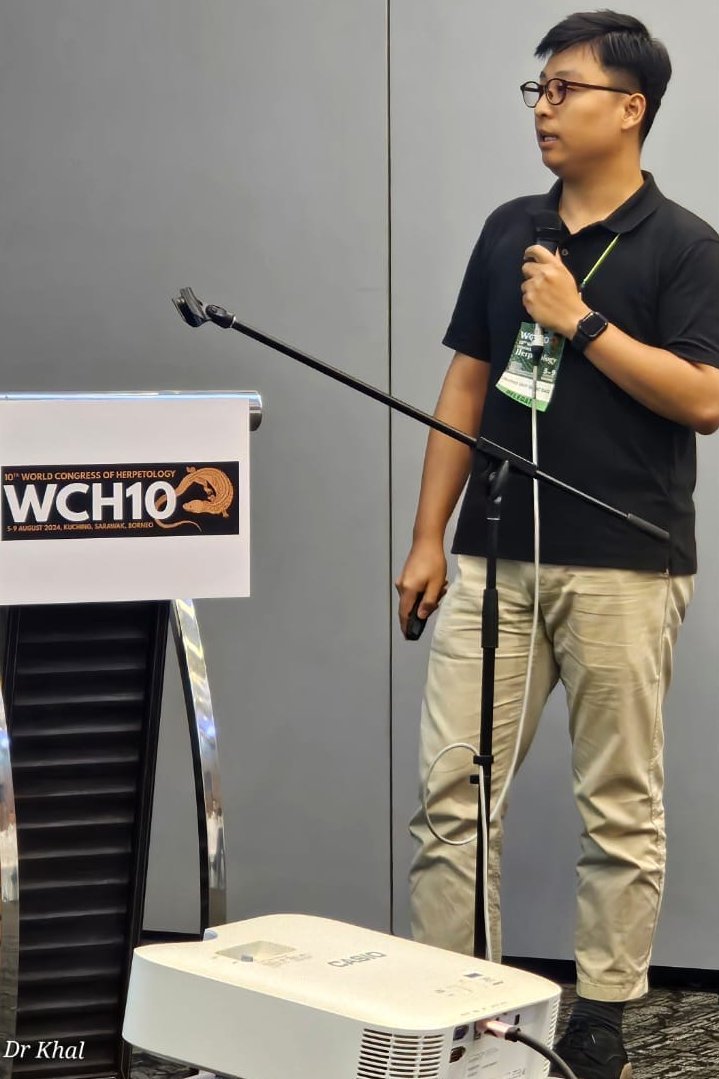
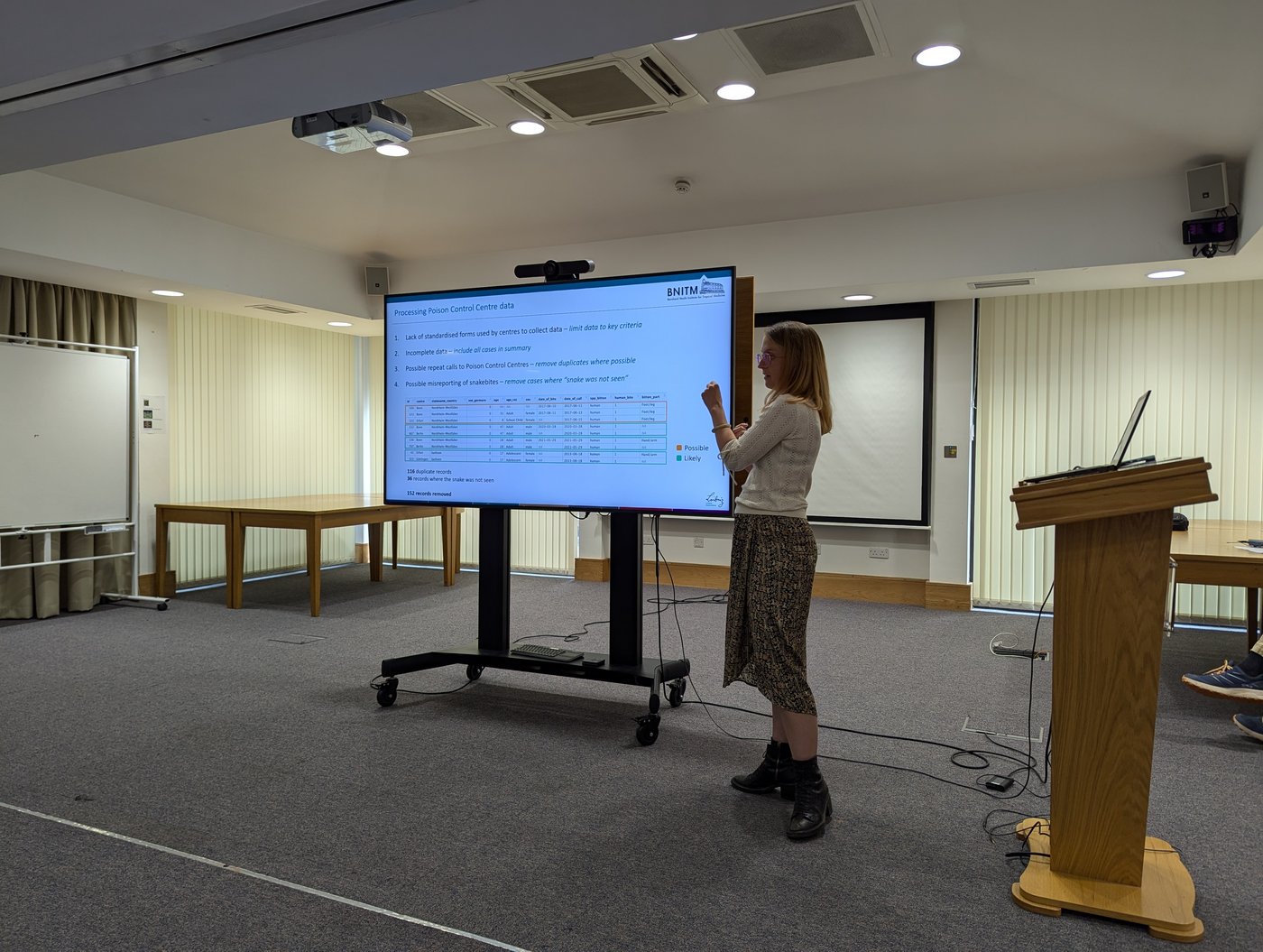
May-July 2024
Let’s talk about snakebite!
Communication on neglected diseases, such as snakebite envenoming, is important to raise awareness of the dangers and preventative measures. By educating the public about snakebites, lives can be saved and misconceptions corrected. In addition, such media work helps medical professionals to spread best treatment practices.
Between May and July, our group at BNITM focused on public outreach in addition to our usual activities. On 30th of May, our group leader Dr Benno Kreuels gave a webcast lecture on snakebite envenoming at the University Hospital of Leipzig (UKL). He talked about the general problem and extent of snakebite envenoming, the prevalence, the different clinical symptoms, the production of antivenom and problems with antivenom distribution and application, as well as previous studies by the working group. You can watch the webcast in German here.
On 7th of June, Dr Benno Kreuels was invited to talk about snakebites at the Symposium for International Health held at the German Federal Foreign Ministry in Berlin. On 20th of June, Dr Jörg Blessmann held a lecture on the general topic of snakebite envenoming at the specialist toxicologists training course organised by the German Society of Toxicology in Berlin. On 21st of June, the BUKO-Pharma podcast “NT-wie?” on snakebite envenoming was published which featured the group's PhD candidate Moses Aron. You can listen to the episode in German here. On the 4th of July, Dr Benno Kreuels was also invited to the German podcast “Infektiopod” to talk about snakebite envenoming. Similar to the webcast, in the podcast he talked about why snakebite envenoming is an important disease, what clinical syndromes can develop from snakebites, how antivenoms are produced, when antivenoms should be administered and the lack of data on the epidemiology of snakebite envenoming. The podcast is supported by the German Center for Infection Research (DZIF) and is available on Spotify, Apple Podcasts. You can also find the episode here.
On the 8th of July, Dr Benno Kreuels held an online lecture at the German Society for Tropical Medicine about venomous and poisonous animals. Next to snakebite envenoming, he touched upon the issue of envenomation by spiders, scorpions and marine life.
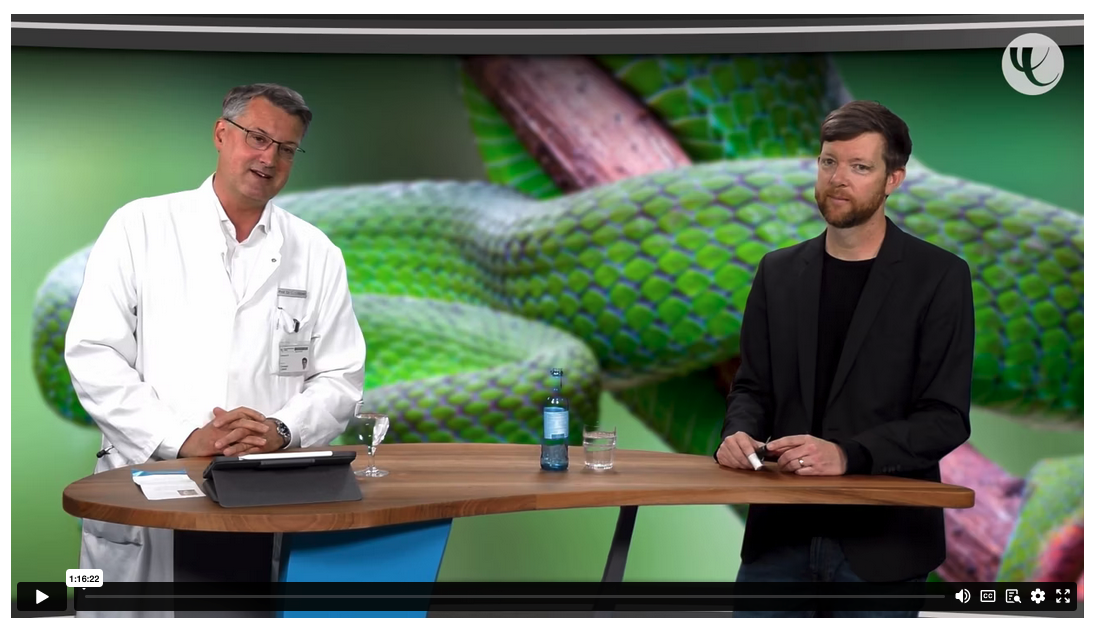
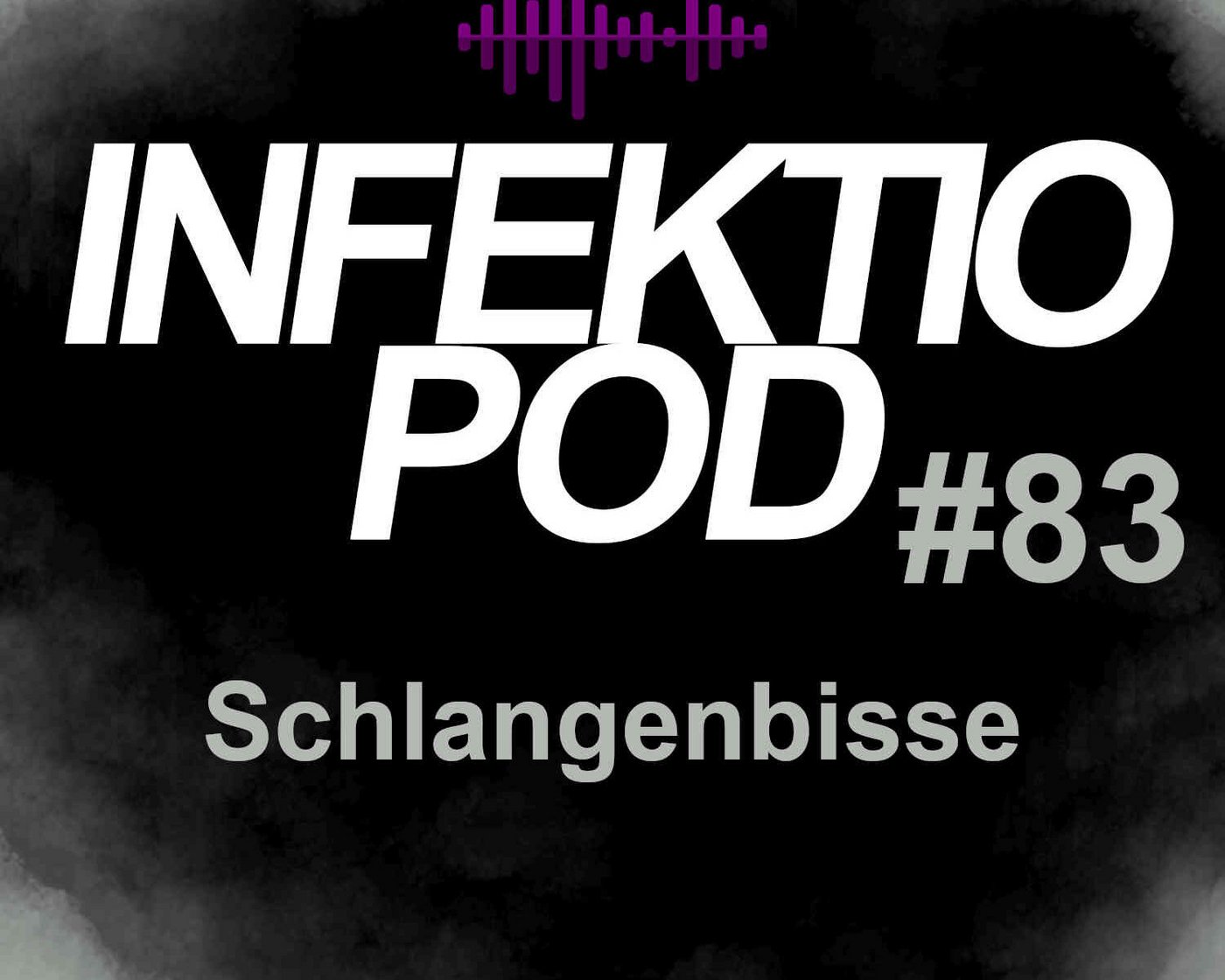
May 2024
Experiences from visiting the Kenya Snakebite Research and Intervention Centre
Collaboration between different countries and institutions is crucial to achieving the WHO's goals for reducing the burden caused by snakebite envenoming by 2030. Only through united efforts and by sharing effective solutions can we effectively combat the devastating impacts of snakebite envenoming worldwide.
On 30th of May, our PhD candidate, Moses Aron, visited the Kenya Snakebite Research and Intervention Centre (K-SRIC) at the Institute of Primate Research (IPR). The centre is dedicated to the collection and research of venomous snakes and the development of antivenoms and preventative measures. On his tour of the snake farm, he was greeted by an impressive collection of venomous snakes from all over Kenya. This variety of snake species is used to conduct vital research and develop antivenoms. The centre responds to reports of snakes being found by sending a specialised team to safely collect the animals. Cooperation with the relevant ministries is crucial for supporting this important work. During Moses’ visit, he learnt how such a model could also work in Malawi. Another important aspect of K-SRIC's work is prevention work in the communities. Customised and culturally sensitive messages are used to raise awareness of snakebites and first aid measures are taught. These preventative approaches are crucial to reducing the number and severity of snakebites. Cooperation between the scientific institutions and the local communities ensures that the measures developed are effective and sustainable. Overall, Moses found his visit to K-SRIC extremely informative and inspiring. The possibility of setting up such a facility in the future in Malawi seems promising, especially if some of K-SRIC's proven strategies can be implemented.
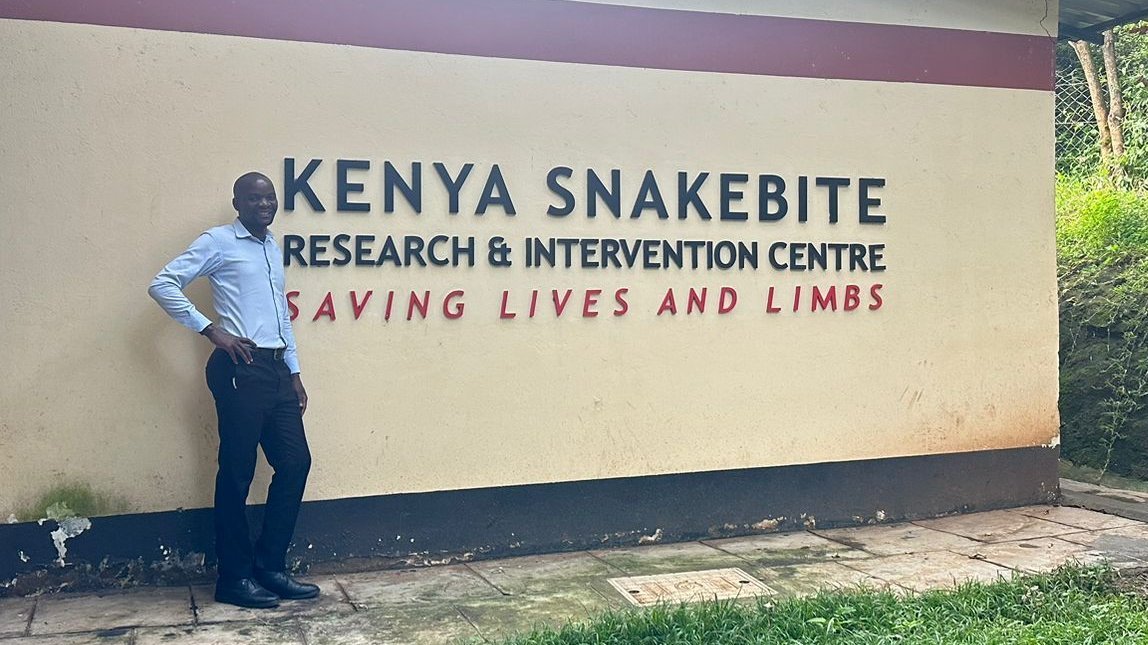
May 2024
Building Capacity to Save Lives: Trainings on Snakebite Management Expand to Dong Nai, Thua Thien Hue, and Dien Bien Provinces in Vietnam
Effective training gives healthcare workers the necessary knowledge and skills to properly diagnose, treat, and care for snakebite victims, especially in areas where snakebites are common. In addition to having antivenom available, having well-trained medical staff is vital for providing quick, life-saving treatments. This saves lives and reduces the long-term health effects of snakebites.
Following the success of the first training in Lam Dong, the comprehensive one-day training programme on “Clinical Management of Snakebite Envenoming” has extended its reach to three more provinces in Vietnam, namely Dong Nai, Thua Thien Hue, and Dien Bien. These events, organised by the Institute for Community Health Research (ICHR), Hue University of Medicine and Pharmacy, and the Bernhard Nocht Institute for Tropical Medicine (BNITM), featured Dr Nguyen Thi Thuy Ngan from Cho Ray Hospital in Ho Chi Minh City.
Over two months, three trainings were conducted: On 28th of March 2024, the training in Dong Nai saw participation from 39 doctors and nurses across five provinces: Dong Nai, Dak Nong, Ba Ria-Vung Tau, Tay Ninh, and Binh Phuoc. This training received support from the Dong Nai Center for Disease Control (CDC Dong Nai). On 22nd of May 2024, the training in Hue had 31 doctors and nurses from Quang Binh, Quang Tri, Thua Thien Hue, Da Nang, Quang Nam, Quang Ngai, Phu Yen and Binh Dinh provinces. On 28th of May 2024, the training in Dien Bien attracted 28 participants from Lai Chau, Son La, Ha Giang, Yen Bai and Dien Bien provinces. The training received support from Dien Bien Provincial Hospital.
The participants in all training were assessed by the pre- and post-tests on knowledge of snakebite management. These trainings underscored the importance of well-trained medical personnel in saving lives and minimising long-term health consequences from snakebites, alongside the crucial role of antivenom availability. Besides, each training focused on and covered different geographical regions of Vietnam, which also shared different medically important venomous species of Vietnam.
These trainings are part of the grant “Towards better health care for snakebite envenoming in Vietnam” which is funded by the Else Kröner-Fresenius-Stiftung (EKFS). More information can be found on the EKFS website: https://www.ekfs.de/en/humanitarian-funding/currently-funded-projects/verbesserung-der-gesundheitsversorgung-von
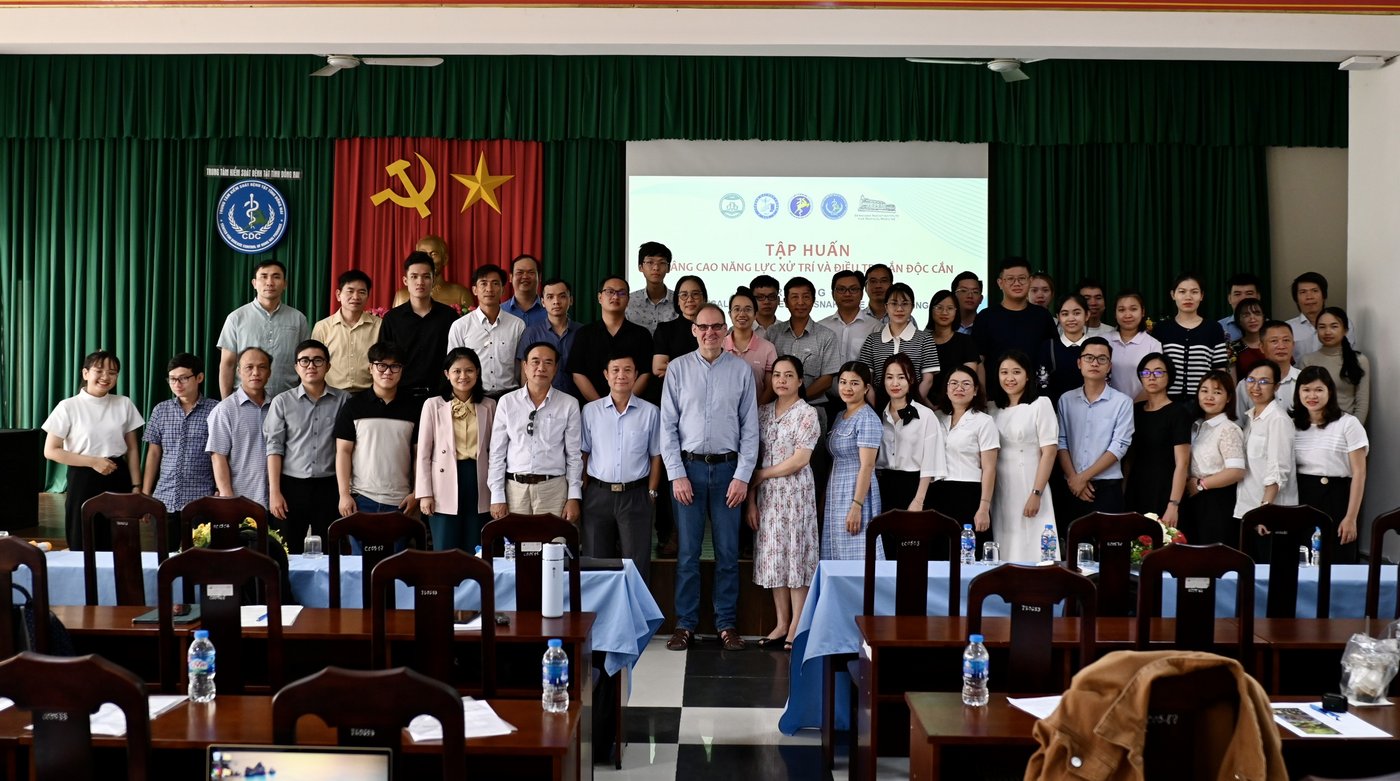
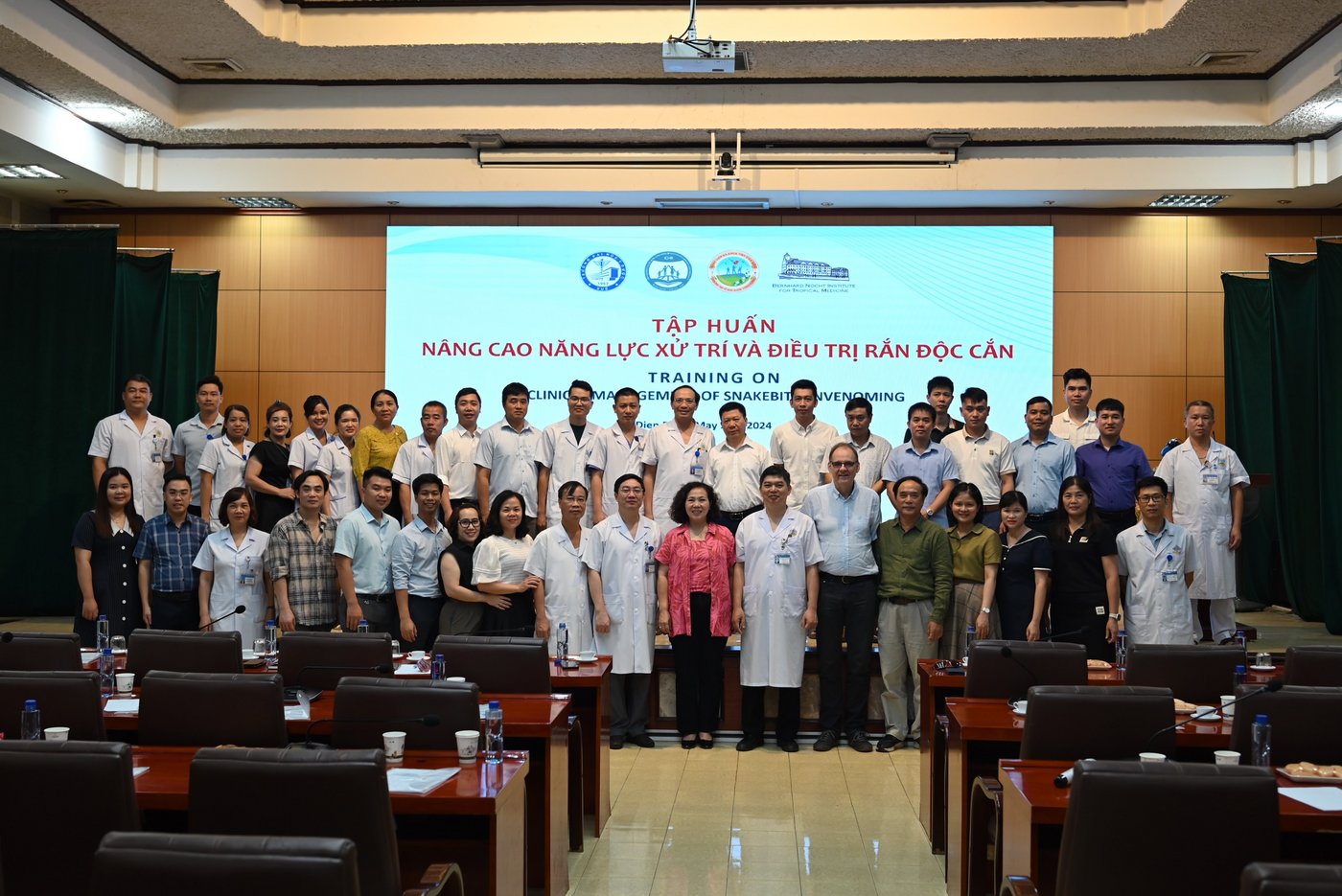
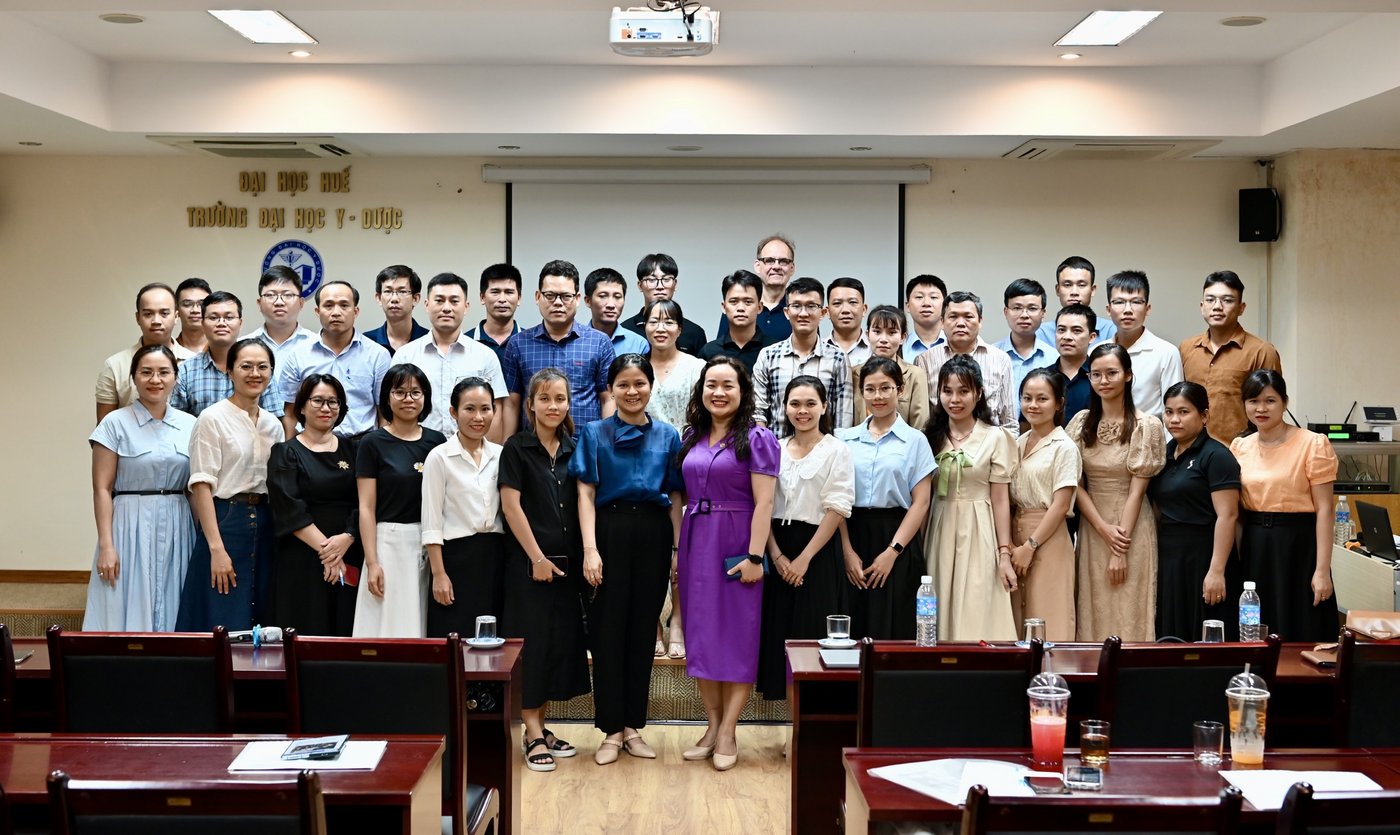
March 2024
Mambas, cobras and more: First training courses on the clinical management of snakebites in Neno and Mwanza, Malawi, attended by 130 participants
Snakebite envenoming is a major health threat worldwide. Dealing with such cases requires a thorough understanding and rapid intervention. By providing essential knowledge to medical staff, the aim is to improve clinical treatment, mitigate the long-term health consequences and ultimately protect the lives of communities affected by snakebites.
On the 5th to 8th of March, the Snakebite Envenoming Working Group organised the first training on the clinical management of snakebites for the medical staff from different hospitals in Mwanza and Neno, Malawi, together with Partners in Health, the hospital directors and Reptile Education and Conservation Africa (RECA). The trainings were part of the hospital partnership* with Neno District Hospital.
The training took place over four days: twice in Neno with participants from the Neno District Hospital, the Lisungwi Community Hospital and the Zalewa Health Centre, twice in Mwanza with participants from the Mwanza District Hospital, the Mwanza District Health Office and the Thambani Health Centre, to involve as many participants as possible, and was met with great interest with a total of 130 participants. Participants heard from external expert speakers such as Tim Brammer and Joseph Tepani from RECA, as well as internal experts Moses Aron, Dr. Paul Rahden and Dr Benno Kreuels. During the training, participants learned about the relevant venomous snakes in Malawi and how to identify them, their venoms and syndromes, first aid and supportive treatment, specific treatments such as antivenom, indication, dosage, side effects, treatment monitoring as well as community engagement and prevention.
During the training, participants also shared their own experiences. Our team learned a lot from the experiences of the participants and the hospital management, e.g. about the syndromes patients present with and the challenges healthcare staff face when dealing with snakebites. These insights will be incorporated into the further course of the hospital partnership.
* The Hospital Partnership is a funded project of the Hospital Partnerships funding programme of the Deutsche Gesellschaft für Internationale Zusammenarbeit (GIZ) GmbH. The programme is commissioned and funded by the German Federal Ministry for Economic Cooperation and Development (BMZ). The Else Kröner-Fresenius-Stiftung (EKFS) co-finances the funding programme on a part-financed basis. Homepage: https://hospitalpartnerships.org/




February 2024
Welcome to the team, Jade and Paul!
We are delighted to introduce our newest team members, Jade Rae and Paul Rahden. Both are starting as post-docs in our working group and will help supervise our projects and students.
Jade already started on 1 December 2023 and is an epidemiologist from Australia. During her PhD, she was based on the Thai-Myanmar border, where she investigated how malaria surveillance and response methods can be optimised to accelerate elimination efforts in the region. We are already experiencing the positive impact she has on our existing projects and team with her impressive skills, and are looking forward to the new ideas and projects she will bring to the table.
Paul started on 1 February 2024 and is a medical doctor from Hamburg. He adds experiences from clinical work in low-income settings including work with point-of-care ultrasound, which he recently gained at the Edward-Francis-Small Teaching Hospital in The Gambia. We are sure that Paul will be a fantastic addition to the team.
We are delighted to have Jade and Paul as part of our team and are excited to see all they will contribute to our team.

January 2024
Visit of partner sites in Hue, Vietnam, and Vientiane, Lao PDR
A pillar to reach the World Health Organisation’s (WHO) goals on snakebite envenoming is strong partnerships, coordination and resources. The strategic use of partnerships is an opportunity to pool collective knowledge, resources and innovation to facilitate the development of comprehensive strategies to contribute to the WHO’s goals of halving snakebite-related deaths and disabilities by 2030.
Our group leaders Dr Jörg Blessmann and Dr Benno Kreuels kicked off 2024 with a visit to further strengthen partnerships in Vietnam and Laos to promote collaboration on snakebite envenoming research. During the visit in Hue, Vietnam, they met Dr. Dang Thi Anh Thu, Director of the Institute for Community Health Research, to discuss possible further cooperation and the acceptance of Dr. Truong Quy Quoc Bao into the PhD programme at Bernhard Nocht Institute for Tropical Medicine (BNITM) and the Medical University in Hamburg. Dr Kreuels gave a presentation about the BNITM, giving an overview of its history and notable milestones. The question of whether the term "tropical medicine" is still appropriate was discussed, as well as the establishment of the new department for implementation research at the BNITM and a short introduction to the research group snakebite envenoming. The audience was composed of students and lecturers from the Institute for Community Health Research and the Faculty of Public Health.
In Lao PDR, they met with Dr Ying-Ru Jacqueline Lo, the WHO representative in Lao PDR, an infectiologist from Hamburg who worked at BNITM for many years before she started at WHO in 1998. The discussions centred on urgent health issues, in particular the problem of snakebites, the availability of antivenom in Lao PDR and how to improve the supply. At the Lao-Oxford-Mahosot Wellcome Trust Research Unit (LOMWRU) in Vientiane, they met Professor Elizabeth Ashley (Director of LOMWRU) and Dr. Manivanh Vongsouvath (Director of the Microbiology Laboratory) to discuss a possible collaboration in the field of infections after snakebites. A visit to Setthatirath Hospital, which has been a partner since 2017, was on the agenda on 25 January. The discussions at the hospital covered topics for further collaboration in clinical toxinology and included the handover of the 960-page book "The Snakes of Laos” edited by Alexandre Teynié, Patrick David and Gernot Vogel. The trip ended with a visit to the Pasteur Institute in Vientiane, where they met with the Director Dr. Philippe Buchy. Dr. Blessmann gave a lecture on management of snakebite envenoming in Lao PDR for interested staff of the Institute who are at risk for snakebite while working in the field.


November 2023
First training on clinical management of snakebite envenoming in Wa, Ghana, attracts 100 participants
Snakebite envenoming poses a significant health threat worldwide. Dealing with these cases requires precise knowledge and swift action. By equipping medical staff with essential skills, the aim is to improve clinical management, reduce long-term health consequences and save lives in communities affected by snakebites.
On the 7th and 8th of November, the Snakebite Envenoming Working Group organised the first training on the clinical management of snakebites for the medical staff of two hospitals in Wa, Ghana, together with the Global Health and Infectious Diseases Research Group at the Kumasi Center for Collaborative Research. The training for staff from the Upper West Regional Hospital and the Municipal Hospital in Wa is part of the Hospital Partnership*.
The training took place twice to involve as many participants as possible and was met with great interest with a total of 100 participants. Participants heard from external expert speakers such as Prof Abdulrazaq G. Habib, Bayero University, and local expert Dr Steve Blankson, as well as internal experts Melvin Agbogbatey and Dr Benno Kreuels.
During the training, participants were also able to share their own experiences and name their biggest challenges when dealing with snakebite patients. Most participants identified the availability of antivenom and the delayed presentation of patients at the hospital as the two biggest problems. Following the roll-out of a clinical database in both hospitals to assess the snakebite patients being treated there, further customised training will be provided.
* The Hospital Partnership is a funded project of the Hospital Partnerships funding programme of the Deutsche Gesellschaft für Internationale Zusammenarbeit (GIZ) GmbH. The programme is commissioned and funded by the German Federal Ministry for Economic Cooperation and Development (BMZ). The Else Kröner-Fresenius-Stiftung (EKFS) co-finances the funding programme on a part-financed basis. Homepage: https://hospitalpartnerships.org/


September 2023
Exploring the Complex World of Snakebite Envenoming: The Interdisciplinary Summer School
Snakebite envenoming is a highly neglected disease that disproportionately affects poor populations. It is the deadliest of the neglected tropical diseases (NTDs) and is resulting in more than 400,000 permanent disabilities annually. Given the complex nature of snakebites, which affect multiple domains of health, ecology and society, a comprehensive One Health approach is essential to address this widespread problem and achieve the World Health Organization's ambitious goal of reducing death and disability caused by snakebites by 50% by 2030.
From 25th to 29th of September, the Snakebite Envenoming Working Group organised a hybrid interdisciplinary summer school on snakebite envenoming together with Dr Ulrich Kuch, Goethe University, and Dr Maik Damm. This summer school was supported by the German Federal Ministry of Education and Research (BMBF) as part of the German Alliance for Global Health Research (GLOHRA).
The 112 participants who took part online or in person were taught by over 25 expert lecturers from around the globe. Their subjects covered ranged from biology and venom analysis to clinical management, best practices from various countries, social sciences, public policy, and a myriad of other topics. Additionally, more than 30 participants had the opportunity to showcase their ongoing, planned, or completed projects and receive valuable feedback from their peers.
Positive and constructive feedback was received from both participants and lecturers, and interest in attending similar events in the future was expressed by many. Particular praise was given to the highly regarded interdisciplinary approach, the well-structured format that seamlessly integrates the different components and the outstanding expertise of the speakers.
More information can be found in the report available on GLOHRA’s website: https://globalhealth.de/news/view/interdisciplinary-summer-school-on-snakebite-envenoming.html

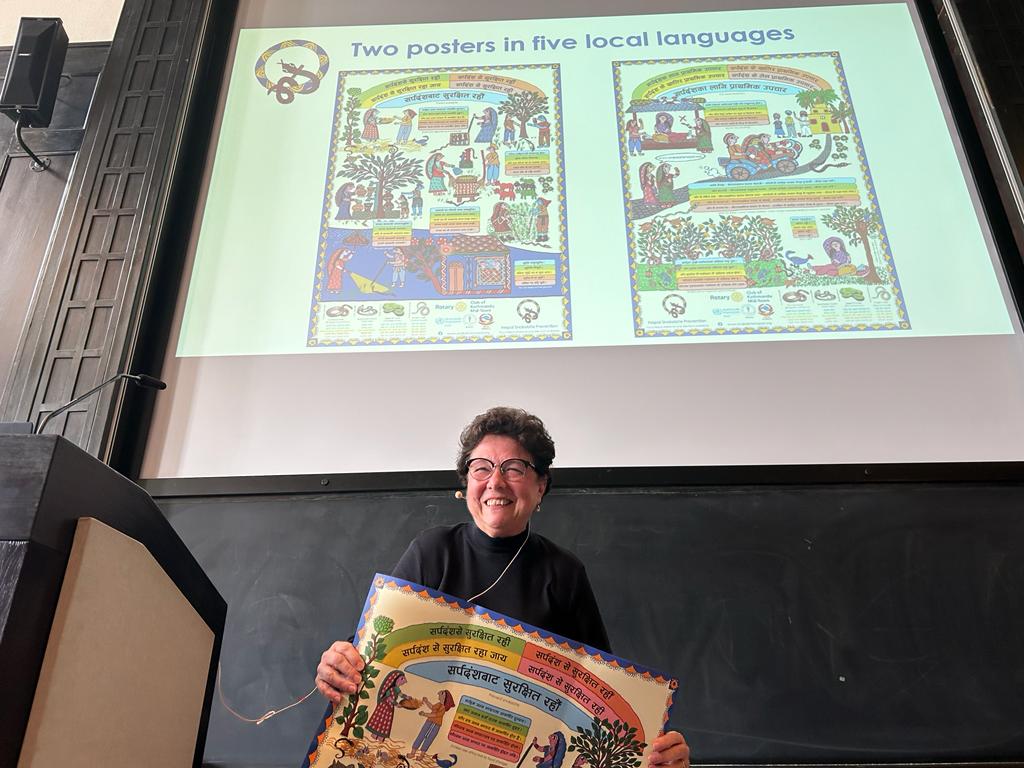

September 2023
Welcome to the team, Grace!
We are thrilled to introduce our latest addition to the team, Grace Katha. Grace will start her PhD at Kamuzu University of Health Sciences (KUHeS) in Blantyre, Malawi, and will be involved in the ongoing POCUS project and research.
Grace is a doctor at Queen Elizabeth Central Hospital, Blantyre, in the Adult Emergency Department and has also been working as a clinical lecturer at the Kamuzu University of Health Sciences (KUHeS). She is dedicated to improving emergency care in Malawi and beyond and believes that Point-of-Care Ultrasound (POCUS) is a valuable tool for achieving this goal.
Her PhD objective is to create a strong plan with effective strategies for using POCUS in secondary healthcare in Malawi. This plan will help POCUS go from a promising technology to a powerful tool that improves patient care, guides clinical practice, and influences healthcare policies.
We’re very happy to have Grace join our team! Her expertise and enthusiasm are a fantastic addition, and we’re excited to see the positive impact she will bring to our work and the project.
This PhD is financed through the grant “Taking Point-Of-Care Ultrasound to the District in Malawi” which is funded by the Else Kröner-Fresenius-Stiftung (EKFS). More information about the project can be found on the EKFS website: https://ekfs.de/humanitaere-foerderung/aktuelle-foerderungen/taking-point-care-ultrasound-pocus-district
August 2023
First training on snakebite management in Da Lat, South Vietnam, attracts medical professionals from five provinces
Effective training ensures that medical professionals have the necessary knowledge and skills to correctly diagnose, treat and care for snakebite patients, especially in regions where snakebites are common. Apart from the availability of antivenom, well-trained medical personnel are the critical link for the timely provision of life-saving interventions to people in need, which ultimately save lives and minimise the long-term health consequences of snakebites.
On 30th of August 2023, 40 medical professionals comprising doctors and nurses hailing from five different provinces (namely Gia Lai, Dak Lak, Lam Dong, Ninh Thuan, and Binh Thuan) converged in Da Lat, Lam Dong Province, South Vietnam. The purpose of this gathering? A comprehensive one-day training programme focused on the critical subject of snakebite envenoming. This event was jointly organised by the Institute for Community Health Research (ICHR), Hue University of Medicine and Pharmacy, and the Bernhard Nocht Institute for Tropical Medicine (BNITM).
For this first training, the organisers managed to secure the expertise of Dr. Nguyen Thi Thuy Ngan, an expert in the clinical management of snakebite envenoming from Cho Ray Hospital in Ho Chi Minh City. With Dr. Nguyen Thi Thuy Ngan at the helm, the training programme proved to be an invaluable resource for these medical practitioners. The training event included five insightful lectures covering the characteristics of venomous snakes found in Vietnam, assessment of patients, treatment of envenoming, possible side effects of administering antivenom and the occurrence and treatment of infections following snakebites.
Another interesting element of the training programme was that representatives from each of the five provinces shared their particular experiences and highlighted the specific challenges they face in treating snakebite patients in their respective regions. This open exchange of knowledge and experience not only enriched the training but also fostered a spirit of cooperation among the health professionals.
These trainings are part of the grant “Towards better health care for snakebite envenoming in Vietnam” which is funded by the Else Kröner-Fresenius-Stiftung (EKFS). More information can be found on the EKFS website: https://www.ekfs.de/en/humanitarian-funding/currently-funded-projects/verbesserung-der-gesundheitsversorgung-von


August 2023
Focus on POCUS: Expansion of point-of-care ultrasound (POCUS) courses in Malawi
Unlike complex imaging technologies, ultrasound's simplicity allows for widespread clinical evaluation, providing vital diagnostics and patient care in financially challenged rural areas. Point-of-care Ultrasound (POCUS) offers an easy-to-learn, cost-effective method for rapid diagnosis, making it a pivotal tool for enhancing medical care in underserved populations, and addressing conditions from (non-)infectious diseases to emergencies.
In August 2023, the Kamuzu University of Health Sciences (KUHeS) and the Bernhard Nocht Institute for Tropical Medicine (BNITM) jointly organised two point-of-care ultrasound (POCUS) training courses. Both courses were organized and run by Dr. Tamara Phiri, KUHeS, and Dr. Benno Kreuels, BNITM.
The first course included selected, excellent participants of previous “POCUS Beginner Courses” who use POCUS regularly in their daily practice and focused on building local faculty for future courses. All successful graduates of this course then acted as trainers on a course for beginners in the following week. In this course 13 participants from different departments at Queen Elizabeth Central Hospital, District Hospitals in Mwanza and Neno, as well as from a primary health care center in Ndirande learned basic POCUS skills including relevant protocols such as FAST, FASH and CURLS.
Participants provided invaluable feedback that shed light on the impact and effectiveness of the trainings. One recurring theme in the feedback was how their practice will improve as a result of the course, as one student stated: “This training course has been of great help and essence to my practice in future as a medical doctor. It will definitely enable prompt diagnosis of certain conditions and expedite treatment.” One participant even said: "One of the best and most useful courses I’ve ever attended". Another student advised: "I think this should be integrated into routine medical practice. All doctors should do this training as part of their internship."
These trainings are part of the grant “Taking Point-Of-Care Ultrasound to the District in Malawi” which is funded by the Else Kröner-Fresenius-Stiftung (EKFS). More information can be found on the EKFS website: https://ekfs.de/humanitaere-foerderung/aktuelle-foerderungen/taking-point-care-ultrasound-pocus-district


July 2023
Venomous challenges in North and South Laos: Training in management of snakebite envenoming in Oudomxay and Savannakhet
Ensuring safe and effective treatment for snakebite envenoming is an important pillar to achieving the WHO goal of reducing mortality and morbidity of snakebite patients. Besides the availability of antivenom, training of health care workers is an important part.
After the previous trainings in the capital Vientiane, in Champassak in the south and Luang Prabang in the north, two more trainings were conducted in July 2023. The trainings were organised by Dr. Sulaphab Hanlodsomphou, Ms. Thipmalakham Sythala, Dr. Khamlab Senbounsou, Dr. Bounlom Santiskou and Dr. Jörg Blessmann within the Hospital Partnership programme*.
One training took place in the southern province of Savannakhet, where teams from three provincial hospitals (Khammouane, Bolikhamxay and Savannakhet) and one district hospital (Khamkeut district in Bolikhamxay province) participated. Another training session was also held in the northern province of Oudomxay, where teams from four provincial hospitals (Bokeo, Luang Namtha, Oudomxay, Phongsaly) shared knowledge and improved their skills. A total of 38 participants attended the trainings.
During these sessions, the participating teams provided in-depth insights into the existing snakebite envenoming landscape in their hospitals, namely the availability of antivenin, the number of patients and the existing challenges.
* The Hospital Partnership is a funded project of the Hospital Partnerships funding programme of the Deutsche Gesellschaft für Internationale Zusammenarbeit (GIZ) GmbH. The programme is commissioned and funded by the German Federal Ministry for Economic Cooperation and Development (BMZ). The Else Kröner-Fresenius-Stiftung (EKFS) co-finances the funding programme on a part-financed basis. Homepage: https://hospitalpartnerships.org/


March – April 2023
Kick-off of new hospital partnerships: Snakebite envenoming in Malawi and Ghana
In many countries, the available and marketed antivenom has not been clinically tested locally and may therefore not be suitable for effective treatment. In addition, there is often a shortage of suitable antivenoms, which is why the use of the drug should be linked to clear indications. Clinical data on snakebite patients can help inform and improve treatment decisions and provide valuable data on the efficacy of antivenoms.
In March and April 2023, part of the Snakebite Envenoming research group visited partners in Malawi and Ghana to launch new hospital partnerships*. Both partnerships address the clinical management of snakebite envenoming, which includes training clinicians, adapting guidelines and establishing a clinical database.
The hospital partnership in Neno, Malawi, is with Neno District Hospital and is supported by Partners in Health (PIH). During visits to the partner sites in Neno District Hospital and Lisungwi Community Hospital, important contacts with the local medical staff were established and intensified. Discussions took place about the concrete work processes for snakebite envenoming and the experiences, but also the difficulties that arise.
In Ghana, the hospital partnership is with the Upper West Regional Hospital (UWRH) in Wa, but doctors and patients from Wa Municipality Hospital are also involved. The partner hospitals in Wa see many cases of patients with snakebite envenoming. Here, the team of the BNITM and the cooperating Ghanaian research institution, Kumasi Centre for Collaborative Research (KCCR), were able to directly observe the care of numerous snakebite victims. These patients often have blood coagulation disorders, some of which are life-threatening, for example after being bitten by the very common saw-scaled viper (Echis ocellatus) or other snakes such as the puff adder (Bitis arietans).
* The Hospital Partnership is a funded project of the Hospital Partnerships funding programme of the Deutsche Gesellschaft für Internationale Zusammenarbeit (GIZ) GmbH. The programme is commissioned and funded by the German Federal Ministry for Economic Cooperation and Development (BMZ). The Else Kröner-Fresenius-Stiftung (EKFS) co-finances the funding programme on a part-financed basis. Homepage: https://hospitalpartnerships.org/


March 2023
Malayan pit vipers, Cobras and more: Training on management of snakebite envenoming in Lao PDR
Knowledge about management of snakebite envenoming and availability of appropriate antivenom are crucial for a favorable outcome of this neglected tropical disease. Both factors will influence health-seeking behaviour of snakebite victims in such a way that more snakebite victims will choose hospital treatment instead of traditional healers. Training on snakebite management for health care personnel is one important pillar to achieve the WHO goal to reduce mortality and morbidity of patients with snakebite envenoming.
On 2nd of March 2023, 20 participants attended a training on snakebite management at Setthatirath Hospital, in Vientiane, Lao PDR. The training was organised by Dr. Vangnakhone Dittaphong (Director) and Ms. Thipmalakham Sythala (Head of General Affairs and Planning Department) of Setthatirath Hospital in Vientiane and Dr. Jörg Blessmann (Research Group Leader Snakebite Envenoming) from Bernhard Nocht Institute for Tropical Medicine (BNITM) in Hamburg within the Hospital partnership programme*.
The training consisted of six different thematic blocks: 1) medically relevant venomous snakes, their venom effects and distribution in Lao PDR, 2) patient assessment and monitoring after venomous snakebites, 3) treatment of snakebite envenoming, 4) side effects of antivenom and their treatment, 5) infection after snakebite, and 6) case reports of patients with snakebite envenoming.
* The Hospital Partnership is a funded project of the Hospital Partnerships funding programme of the Deutsche Gesellschaft für Internationale Zusammenarbeit (GIZ) GmbH. The programme is commissioned and funded by the German Federal Ministry for Economic Cooperation and Development (BMZ). The Else Kröner-Fresenius-Stiftung (EKFS) co-finances the funding programme on a part-financed basis. Homepage: https://hospitalpartnerships.org/

November 2022
Interdisciplinary cooperation to reduce the burden of snakebite envenoming: first interdisciplinary meeting on snakebite envenoming in Africa
Snakebite envenoming is a very complex problem to address. It requires not only medical knowledge but also knowledge about the species involved, the mechanisms of the venom, the availability of and access to effective antivenom, the perception of snakebites in the population and also involves prevention campaigns. Therefore, an interdisciplinary approach needs to be adopted to address this problem effectively.
On the 17th of November 2022, the newly established Snakebite Envenoming Research group held a hybrid meeting at the Bernhard Nocht Institute for Tropical Medicine on the topic of “Snakebite Envenoming on the African continent” to bring together various experts, stakeholders and disciplines. Young researchers from various African and European research facilities and experts in the field presented their work on snakebite envenoming. The programme saw a variety of topics being discussed ranging from the history of snakebite research, general topics on venomics, clinical management of snakebite envenoming, novel diagnostics as well as therapeutics, most recent data and much more.
Over 20 people attended the event at the institute and over 50 others participated in the event online.

Front row: Deborah Hosemann (BNITM), Melvin Agbogbatey (KCCR), Austin Gideon-Adombasom (KCCR), Juliette Borri (Policy Cures Research), Leslie Mawuli Aglanu (KCCR), Dr John Amuasi (KCCR), Margareta Lakušić (CIBIO) ©Benno Kreuels



![[Translate to English:] Logo der Else Kröner-Fresenius-Stiftung [Translate to English:] Das Bild zeigt das Logo der Else Kröner-Fresenius-Stiftung.](/fileadmin/media/Allgemeines_und_Platzhalter/Logo/Logo_EKFS_grau_rgb_web.jpg)
![[Translate to English:] Logo der Klinikpartnerschaften [Translate to English:] Das Bild zeigt das Logo der Klinikpartnerschaften.](/fileadmin/media/Allgemeines_und_Platzhalter/Logo/Logo_kp_en_quadratisch.png)
![[Translate to English:] Logo BMFTR [Translate to English:] Logo BMFTR](/fileadmin/media/Allgemeines_und_Platzhalter/Logo/BMFTR_EN_Square.png)
![[Translate to English:] Logo of GLOHRA [Translate to English:] Logo of GLOHRA](/fileadmin/media/Allgemeines_und_Platzhalter/Logo/GLOHRA_globalhealth.jpg)





